A Comparative Approach to Learning Korean


My Korean Language Study Plan
Explaining my korean language study plan.
I thought that I’d share my Korean language study plan to give a better idea of exactly how I’m going to go about learning Korean. Before that, as a sort of a disclaimer, it might be worth repeating what I mentioned in my first post about the fact that I’m not in a hurry to get good at Korean. That’s why you won’t see any mention of hard deadlines as part of this study plan. This whole studying Korean thing is purely for fun and I want it to be zero stress. I know that I’m taking a really laid back approach that might not work for everyone, but I’m pretty confident about it for myself.
The first part of my Korean language study plan as of right now is fairly orthodox. There are basically four things I will tackle in the very beginning:
- Alphabet ( Hangul )
- Pronunciation
- Basic Greetings and Phrases
As you can see, before anything else, I need to learn the alphabet, or Hangul .
Learning the alphabet is usually the place most people start in any language. It’s not just about laying the foundation for reading and writing, but getting used to how the language sounds (listening) and learning correct pronunciation (speaking). In that way #1 and #2 on my list are essentially paired together.
Next I plan to move on to some essential greetings and phrases. Things like “hello” or “how are you?” or “my name is…”. In most cases, when studying a foreign language, even before you learn grammar, you typically learn basic greetings or everyday expressions. In some cases, the grammar behind these sayings is something you might not get taught until much later.
For example in Japanese you might learn the phrase お元気ですか? [ ogenki desu ka? ] as the Japanese equivalent of “how are you?” What you may not learn for a while however, is the reason for the prefix お- or how this prefix plus -です marks this as a polite way of speaking, as opposed to an informal way of speaking that looks and sounds different.
Imagine trying to explain this grammar to an absolute beginner, “What the heck is -です even? ‘Copula?’ I have never heard that word in my entire life. Okay, so what does か mean? ‘Particle?’ What’s a particle?” These are not concepts a monolingual English speaker would typically know. Additionally, although the Kanji for genki are among the first you would encounter and learn in a Japanese class, you might instead see it written in hiragana [げんき] depending on the textbook you are using. Not to mention, at this stage you still probably haven’t even fully grasped exactly why Japanese has three writing systems (in addition to romanization). Anyways, the main point I’m trying to make here is that sometimes with learning a new language you simply have to memorize some things first and the understanding comes later. I think this is perfectly fine though.
Finally, rounding out these first four things in my Korean language study plan is numbers. This would include basic arithmetic words like “add” and “subtract.” I would also go ahead and add in various counters while I’m at it. I already know that this concept exists, because Japanese has them too, and I think it makes a lot of sense to touch on them while learning numbers in Korean. Even if I don’t have them fully memorized it will help to have seen and heard some of the more common counters.
Deviating from the Norm
Up until this point my Korean language study plan probably seems similar to how any beginner’s class might be structured. But once I have the alphabet and pronunciation down, I’m going to jump right into sentence patterns, regardless of “level of difficulty.” The reason I want to do this is to take advantage of the similarities between Japanese and Korean grammar. Basically I will be looking for the Korean language equivalent to Japanese language sentence patterns.
Vocabulary will go hand in hand with grammar. When I find a sentence pattern or grammatical structure I want to study I’ll look for words that I use in that sentence and study those as well. I’ll keep a list and review the vocabulary when I practice the sentence pattern. This adds a level of personalization to my language studies, instead of studying vocabulary lists that accompany lessons in a textbook, which may not have a lot of practical use for me. If I am going to be looking at vocabulary lists, I think it would be much better to just look at the most common words used in writing and speaking instead. At least then I’d be learning things which would be immediately useful for reading or speaking.
When I was learning Japanese I remember starting to learn conjugations right after the first 4 things I talked about. I don’t really like this approach, and having the background I do with Japanese nowadays, it doesn’t make much sense for me either, as the way I’ve outlined above is probably easier for me.
My real issue with this way of doing things is that you essentially learn conjugations in isolation. In the early stages it’s a given that you don’t have the grammar or vocabulary to truly see the whole picture of the language. Perhaps it can be overwhelming, in fact it probably is for some people, but I’d always prefer to start off seeing what the completed puzzle should look like first and then be given the individual pieces to try and put it together.
I also don’t want to just sit around learning how to conjugate the equivalent of verbs, adjectives, and nouns for various different vocabulary words and only THEN move onto actually making sentences. That’s way too boring and too much rote memorization to start with. Conjugations are definitely important in learning sentence patterns, but I will deal with that as I come across instances where I need to conjugate.
The Role of Textbooks in My Studies
Textbooks, and classes built around them, generally introduce grammar and vocabulary through themes to a chapter or lesson such as, “introducing yourself” or “at the grocery store.”
Furthermore, textbooks like to take a gradual or linear approach to teaching you grammar, introducing more complex patterns as you get more fluent. On top of that, the number of grammar points is usually limited as the majority of people using the textbook or studying the language will not have learned another language before.
This makes sense in most cases. I can see the argument in favor of this way of learning, especially if you are going from an SVO language (e.g. English) to an SOV language (e.g. Japanese) as I originally did. But my starting point is different, so I have to go about studying differently too. I am not expecting there to be a textbook made for someone who fits my profile, as it’s not going to be a big enough audience to make it worth the publishers’ and authors’ time.
What I’m really using a textbook for, besides learning the alphabet and the most basic grammar, is to get an idea for structure and ideas of things I might want to study, just not exactly in the way the book teaches. Textbooks might have explanations for grammar that are really well done, in the cases where it’s not the same in Japanese or similar to one in English and it’s totally new to me this could be really nice to have. That being said though, whatever textbook I ultimately choose isn’t going to be my main source for grammar. I’ll be using a separate, dedicated grammar dictionary for that.
Finally, since I’m not taking a class I’m also limited in my ability to use the pair-work speaking exercises that usually are a big part of each lesson within language textbooks. So that’s another reason textbooks aren’t really going to be what my studies are built around.
You can read more about my thoughts on this topic in my post about Korean textbooks for beginners .
Outline of My Korean Language Study Plan
To recap here is an outline of my study plan as I begin my Korean language studies:
- Grammar and Sentence Patterns
- Conjugations
Looking at this list, I’m actually surprised myself and thinking, “Is that it?” I definitely remember Japanese at least feeling more complex than this. Yes, there was Kanji and the whole learning a different way of structuring sentences to wrap my head around, but looking back it’s always seemed as if things were made to be far more complicated than they needed to be.
I know that I’ve simplified things in my study plan to an extent – for example grammar and sentence patterns encompass a lot of different concepts, such as particles – but, as I see it, this pretty much covers all there is to it for me as far as studying the Korean language is concerned. The next steps are all about applying what I’ve learned.
My next steps in my Korean language journey will be putting to use the things I’ve studied, focusing primarily on reading and listening since I’m self-studying. Doing things like practicing reading (maybe online news or articles) and watching tv shows or listening to music. Eventually I’ll probably need to look into language exchanges or meetups to get speaking practice. As for writing, I’m just going to be practicing in my notes when making vocab lists or writing down grammar. I don’t plan on practicing essays or whatnot for now. I know everything you do in another language reinforces other aspects of said language, but again, I’m not going for absolute max efficiency at all times. Not to mention, I rate writing as my lowest priority when it comes to Korean. I’d much rather focus on the other aspects such as speaking, listening, and reading.
Final Thoughts on My Korean Language Study Plan
The interesting thing about learning a foreign language is that once you progress beyond what I’d call the beginner and early intermediate stages, the only things that are really left for you to do are keep studying grammar and building up your vocabulary. Going beyond that, advanced learners and non-native, but fluent, speakers only have vocabulary to worry about – because vocabulary is practically endless – which is where the idea of language learning being a lifetime endeavor typically comes from. As testament to this fact, I still learn a couple new Japanese words almost every week (usually they aren’t that common or all that useful words, but my point still stands).
As I’ve said before, this study plan is really catered to my needs and based on my capabilities and knowledge of language. But, I want to use this as an example to show there are so many ways to approach learning a language.
After being taught by so many different teachers and professors, and I’m not just talking about the Japanese language, I know what I like and what works for me. For those who don’t have as much experience, I would encourage you to try out lots of different methods, and I mean like really give them a chance, then go with what produces the best results or how you enjoy studying.

You May Also Like

Welcome to Korean Chronicles

Skill Imbalance

Which Beginner Korean Textbook To Choose
Leave a reply cancel reply.
Your email address will not be published. Required fields are marked *
Save my name, email, and website in this browser for the next time I comment.

Learn Korean Online: How-To Guide for Language Study
Last modified: May 16, 2024 | 23 min read | By 90 Day Korean
If you want to learn Korean , then we’ve got you covered!
This guide is going to give Korean learners like you a brief overview of everything you need to know about how to learn Korean . Just follow each section, pick the language learning parts you want to focus on, and go as deep as you’d like.

Below, we’ve listed all of the resources for learning the Korean language in order of importance. Start at the top and work your way down.
If you would like to take this guide with you and study Korean on the go, we’ve got you covered! The PDF guide download is right here:
- 1 Quick Summary
- 2.1 What is the best way to learn Korean?
- 3 How to start learning Korean
- 4 How to Speak Korean for Beginners
- 5.1 Section 1: The Korean Alphabet (Hangeul)
- 5.2 Section 2: How to Read Korean
- 5.3 Section 3: Korean Pronunciation
- 5.4 How to Speak Korean
- 5.5 Section 4: Korean Numbers
- 5.6 Section 5: Korean Vocabulary Words
- 5.7 How to Remember Korean Words
- 5.8 Section 6: Korean Phrases
- 5.9 Section 7: Korean Grammar
- 5.10 Section 8: Korean Conjugation
- 5.11 Section 9: Korean Honorifics
- 5.12 Section 10: Konglish: Magical Korean Words
- 6 Korean Tutorial
- 7 Korean Tutors
- 8 Korean Language & Dialects
- 9.1 Apps for Learning Korean
- 9.2 Korean Dictionary
- 9.3 Korean Translators
- 9.4 Korean Language Classes
- 10 Typing in Korean
- 11 Get a Korean Name
- 12 Learn Korean PDF
Quick Summary
- ✅ Learning Hangeul (the Korean alphabet) in 90 minutes is possible using a step-by-step guide.
- ✅ Korean dramas, movies, and K-pop are fun and practical tools to improve your Korean listening, speaking, and comprehension skills.
- ✅ Consistent, short sessions spent learning Korean are proven more effective than occasional long sessions.
How to Learn Korean
This guide has everything language learners like you need to learn Korean. In each section, we provide lessons on reading, writing, speaking, vocabulary, and pronunciation that you can use to study Korean. It will help if you follow the lessons in this language-learning guide in order. However, if you have already started learning Korean, feel free to skip any parts of the online lessons that you already know.
The only part we recommend not skipping is learning Hangeul (the Korean Alphabet) . It’s easy to learn, and once you master the Korean alphabet, you’ll supercharge your language learning speed .
Once you’ve got that down, skip to the sections of free Korean lessons you want to focus your learning on the most or go in order. It’s your language journey, so study each part as you like and have fun with it. ^^
What is the best way to learn Korean?
The best way to learn Korean is to do a bit each day. For example, studying Korean for 20 minutes a day is much better than studying once a week for 2 hours. Find a pace that’s comfortable for you, and make sure you’re having fun with it!
How to start learning Korean
There are a lot of fun ways to start learning Korean , depending on your goals.
Most often than not, Korean learners start learning the language by knowing how to read and write Hangul or the Korean alphabet. This is the first lesson that will greatly help you progress with the language.
If your goal is to be able to speak Korean, you can start learning Korean by building your vocabulary through Korean dramas, Korean movies, or even K-pop songs. There are plenty of Korean movie options for learning Korean . The same goes for K-dramas and Korean songs.
To bring your Korean skills to the next level, just identify your goals for the language so you don’t have to learn the things you won’t use.
How to Speak Korean for Beginners
As a beginner in Korean, you need to learn the Korean alphabet first to take to speak Korean. It will greatly help you in correctly pronouncing and understanding Korean words.
After you learn the Korean alphabet, you can get into the habit of learning Korean words next. You can speak better with native speakers and improve your ability to speak Korean.
On top of that, it will come in handy if you have access to resources that offer structured Korean lessons. Ideally, these should include vocabulary and grammar lessons, and practical speaking exercises.
If you focus on these foundational aspects first, you’ll find yourself speaking Korean more confidently.
Korean for Beginners
Korean for beginners can be daunting because of the fact that there’s a new alphabet that’s involved in the learning process. However, this shouldn’t hinder you from learning it.
In each section of this guide, we provide online lessons on the main topics of the language. First, do the primary lessons. Once you are comfortable with the main lessons, you may want to consider studying the related lessons. The related lessons will be helpful but are unnecessary to move on to the next section.
Follow the Korean lessons below and work on making consistent progress with the language.
Ready to Speak Korean Like a Local? Join our community of passionate learners and start speaking Korean confidently in just 90 days. Click here to take the first step!👉
Section 1: The Korean Alphabet (Hangeul)
Lesson: https://www.90daykorean.com/how-to-learn-the-korean-alphabet/
The first thing you’ll want to do is learn the alphabet. The Korean Alphabet (한글 | Hangeul) is one of the simplest alphabets to learn, even if you are an absolute beginner.
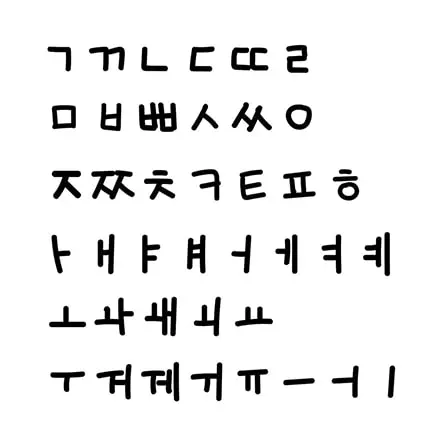
This is probably the most critical step for making any progress in learning the Korean language. Spend 90 minutes learning to read the alphabet or the Korean writing system, and you’ll learn the Korean language quite quickly.
This will also help you learn to speak in Korean since the pronunciation of Hangeul is much more precise than the romanized version [한글 (hangeul) vs. Hangeul, for instance] using the English language.
Related Lesson: Korean Double Consonants
Section 2: How to Read Korean
Lesson: https://www.90daykorean.com/how-to-learn-the-korean-alphabet/#reading-korean-words
After you learn the Korean alphabet, you will need to know how to read Korean. Knowing how to read will make it easier to speak in Korean. Reading aloud will help you with your pronunciation.
Learning to read is fairly simple because words in Korean are broken up into syllables that are 2-4 letters each. Every syllable needs at least one consonant and one vowel.
The letters are read in order, left to right and top to bottom. You can learn how to read Hangul by following the lesson in this section. There are some examples to practice your reading skills as well.
Spend some time reading some simple words, such as Korean slang or the colors in the Korean language. This will be great practice to enhance your reading skills and will help you become more familiar with the words you see on a regular basis.
With frequent practice, you’ll find it easier to speak Korean words and phrases, and soon you’ll be reading Korean wherever you go! You’ll even be able to read the lyrics of your favorite Korean music or song.
Related Lessons: Korean Slang , Colors in Korean
Section 3: Korean Pronunciation
Lesson: https://www.90daykorean.com/korean-pronunciation/
Another important part of learning Korean is the Korean pronunciation. You’ll need to know how to correctly pronounce the letters and words. Improper pronunciation is a mistake that many Korean learners make. Instead, focus on sounding like a native Korean speaker.
In order to have good Korean pronunciation, there are rules that you need to keep in mind as you study and practice pronunciation.
First, the Korean letters are unique, and each letter has its own sound. Second, the English letters associated with them are just a close approximation of the letters’ sounds. This will bring us back to how important it is to study Korean letters.
Just follow the Korean pronunciation rules in the lesson above, and you’ll have a strong foundation.
How to Speak Korean
Lesson: https://www.90daykorean.com/speak-korean/
Once you know how to read Korean, you’re going to want to begin speaking the language as quickly as possible. That will help you to practice pronunciation and start to have simple conversations.
The good news about learning the language is that you can start speaking Korean and have conversations knowing only single words!
That’s right, once you learn the basic verb conjugation (change the verb form) , you can ask questions and answer them. It’s an easy way to get some simple practice with speaking right away. Below is one of our most popular Korean lessons to learn how to make 32 sentences in no time at all. Use it for writing and speaking Korean. We’ll cover the grammar part of that lesson later.
Related Lessons: Korean Sentence Structure
Section 4: Korean Numbers
Lesson: https://www.90daykorean.com/korean-numbers/
Korean numbers are basic building blocks for the language that you should learn early on. They’re a key part of learning Korean.
There are two numbering systems to learn in Korean. They are called the China System (Sino-Korean) and the Korea System (Native Korean).
The China System is very structured, so you can learn to count to a billion by learning less than 20 new words.
Pretty cool, right?
The Korea System takes a bit more time to learn, so we recommend starting with the China System first. You can use this system when you first start to learn Korean. You can learn about the Korea System later.
We’ve got a complete Korean numbers guide in this section, so head there if you want to level up your number skills. For now, here are the numbers 1- 10:
Once you learn the Korean numbers, check out the lessons below. They will help you with telling time in Korean. The related lessons will also help with saying Korean dates and months.
Related Lessons: Telling Time in Korean , Months in Korean
Section 5: Korean Vocabulary Words
Lesson: https://www.90daykorean.com/korean-words/
As you learn Korean, you’re definitely going to want to level up your Korean language skills in vocabulary. The lesson above should help since it gives you a list of the most common words in the Korean language. Learn the Korean vocabulary words first.
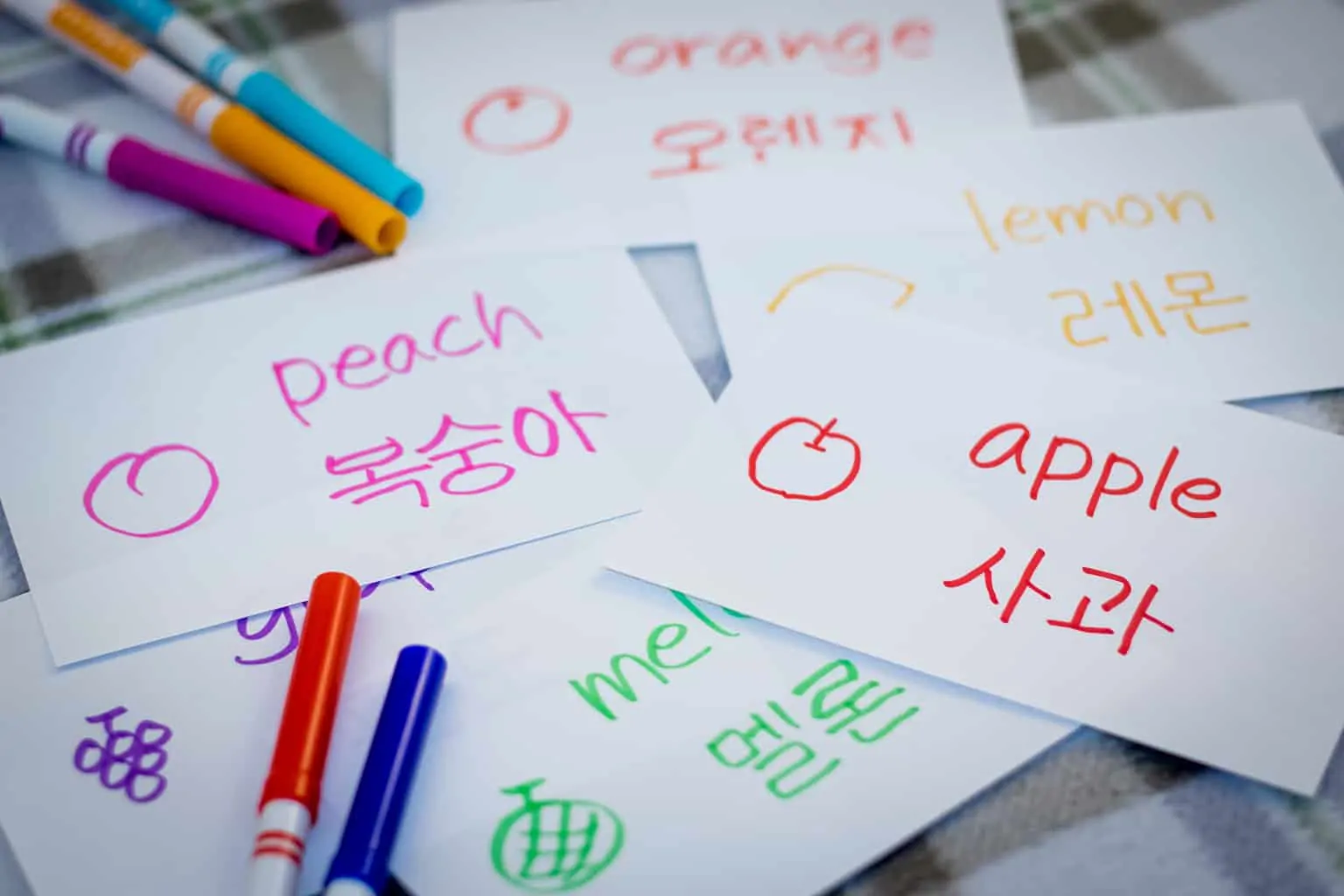
Once you get the basic words down, you can move on to other common vocabulary word lists, such as body parts, animals, fruit & vegetables. There are lessons on those topics below. Having a strong vocabulary base will help you understand more about what you hear in conversations.
Related Lessons: Parts of the Body in Korean , Animals in Korean , Fruits & Vegetables in Korean, Thank you in Korean
How to Remember Korean Words
Lesson: https://www.90daykorean.com/how-to-remember-korean-words/
If your native language is English, it can be challenging to learn Korean because there isn’t a great deal of overlap with words (besides Konglish).
However, there are some great strategies that can help you learn new words quickly. One strategy on how to remember Korean words is to use associations, mnemonics, and stories for the words. For example, the word for “house” in Korean is 집 (jip) . The words “house” and “jip” sound very different from each other. However, the Korean word “jip” sounds like “Jeep,” so you can make a story using imagery about it.

If you like this method, check out our lesson above called How to Remember Korean Words Easily. Lots of useful tips for learning and memorizing new words .
The more vocabulary words you know, the faster you’ll be able to learn Korean and put your skills to use in everyday situations. We recommend learning 2 – 20 new words each day and using an SRS system like Anki. Keep in mind that the more new words you add, the more reviews you’ll have to do each day.
Section 6: Korean Phrases
Lesson: https://www.90daykorean.com/korean-phrases/
If you want to learn Korean quickly, then it’s good to study the phrases in the lesson above first. These are expressions that you’re going to hear all the time, so it’s easy to become familiar with them.
Then, as you continue to learn Korean and develop your skills, you’ll be able to break down these Korean phrases and understand what native speakers of the language are saying.
Related lessons: Survival Korean , Korean Love Phrases , Korean Drama Phrases
Section 7: Korean Grammar
Lesson: https://www.90daykorean.com/korean-grammar/
As you continue to develop your language-learning skills, you’re going to want to start to understand Korean grammar. You don’t need to know it in-depth just yet. Instead, focus on learning the basics of Korean grammar.
The main sentence structure is:
SUBJECT + OBJECT + VERB
The good news is that it’s fairly easy to learn the fundamentals of grammar. Once you begin learning the basic grammar structure of the language, you can up your game and connect your sentences together. You’ll gain confidence in your grammar skills and have bragging rights reserved for those who take the time to come this far with learning the language.
You’ll also want to learn Korean particles, but don’t spend a lot of time on this grammar point at the beginning. Particles are often omitted in speech, so just understand a basic overview of how they work. You can find out more about them and related grammar with the related Korean lessons below.
Related Lessons: Korean Particles , Korean Conjunctions
Section 8: Korean Conjugation
Lesson: https://www.90daykorean.com/korean-conjugation/
When learning the Korean language, you’re going to want to know how to use verbs and adjectives. You can’t use a verb in its base form, so you need to change the ending so it makes sense in a sentence.
Korean conjugations determine the tense and tone of a sentence. For example, let’s take the verb 하다 (hada), which is in its base form. Here are some sample conjugations:
하다 (hada) – to do
해요 (haeyo) – I do
했어요 (haesseoyo) – I did
할 거예요 (hal geoyeyo) – I will do
Once you know the basic conjugations, you’ll want to learn and improve your vocabulary of Korean verbs.
Section 9: Korean Honorifics
Lesson: https://www.90daykorean.com/korean-honorifics/
As you learn Korean, you’ll often see two different versions of the same words and phrases. Often, one is an honorific version, and the other is the standard version.
Korean honorifics are a way of speaking in Korean that shows your relationship to the other person, the person you’re talking about. They’re important to know when learning Korean because you’ll hear them quite often.
So, for example, let’s say you want to talk about your grandfather. Since he’s higher on the social hierarchy than you, then you’ll want to use honorifics with him. You would use different nouns and different grammar, which would show that he’s on a higher level than you in the social hierarchy.
To demonstrate, let’s say you are learning the word “house.” In Korean, you’d normally say 집 (jip) for “house .”
In the case of your grandfather, you’d use 댁 (daek) instead of 집 (jip) when talking about his house. This could be when you’re talking to him or about him to someone else.
Taking some time to learn Korean honorific words will be worth your while. You don’t need to know them all, but learning a few common ones will help. We’ve got a detailed write-up as well as a list of common Korean honorifics in the lesson.
The honorifics are an integral part of learning Korean and understanding Korean culture. If you want to get to an advanced level, then be sure to become familiar with these as you learn the language. It is best to add them to your Korean learning plan and study them on a regular basis. That way, you’ll be familiar with them when you read about or hear them.
Related Lessons: Korean Titles of Family and People
Section 10: Konglish: Magical Korean Words
Lesson: https://www.90daykorean.com/konglish/
There are a number of words that come from the English language, as well as other languages. They’re also called “loan words,” but we think Konglish sounds more fun (Korean + English = Konglish). When you begin learning words in Korean, make sure you start with these first.
Here’s an example of Konglish:
커피 (keopi) = coffee
See how 커피 (keopi) sounds like “coffee”?
You already know more words than you thought! =)
We’ve got the full list of Konglish with audio to help you study. Starting with these words is a great way to learn Korean because they’ll already be familiar to you. Simply read them aloud and see if you can recognize the equivalent word in another language. This is an excellent method for learning Korean that will help you to get speaking and pronunciation practice at the same time!
Related Lessons: Shortened Korean Words
Korean Tutorial
There are several ways to learn Korean, especially nowadays. With the help of technology and the popularity of the Korean language and culture, there are a lot of available Korean tutorial lessons and classes everywhere. There are Korean tutorial lessons and offline and online classes available.
If you’re looking for Korean tutorial lessons and classes, you can start with the free Korean video lessons on YouTube and lessons in blogs . However, to have structured Korean courses that will guide you through learning the language, you can join an online course .
Korean Tutors
If you prefer learning with someone who can guide you one-on-one, you can look for an online Korean tutor. We have a separate article here that will guide you on how to look for the perfect private Korean tutor for you. This can help you consider factors such as schedule, lesson materials, your learning style, and the tutor’s teaching style before you start learning with them. These can be Korean tutors near you, or someone you can contact online.
Korean Language & Dialects
Lesson: https://www.90daykorean.com/korean/
The Korean language is spoken by over 70 million people worldwide. There are different versions of the language for South Korea and North Korea. There are no tones in the language.
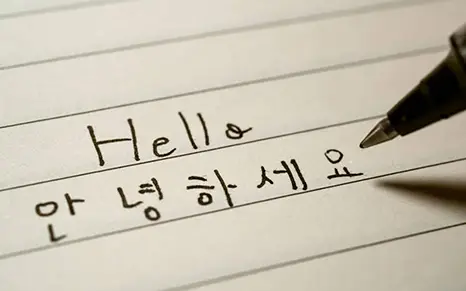
There are various dialects for the 사투리 (saturi) 6 regions of the country. 서울말 (seoulmal | Seoul dialect) is the standard, and 제주말 (jejumal | Jeju dialect) is the most unique.
We recommend learning Korean by focusing on lessons that teach the Seoul dialect. It’s the best for language learning when you’re first starting out. All of our online lessons teach the Seoul dialect. Once you have that down, you can branch out and start learning some bonus colloquial words to your repertoire.
Related Lessons: Satoori
How to Study Korean
As you’re learning Korean, you’re going to want to review what you’re learning. Here are some great tools, resources , and skills you’ll want to develop to help you with studying Korean. Learning Korean is easier than you think as long as you have the proper resources!
Apps for Learning Korean
There are a lot of apps for learning Korean, but it’s best to choose the essentials first. Naver Dictionary has an app form, so that’s an excellent one to start using first.
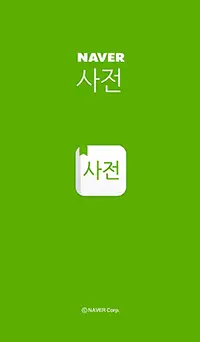
Anki is also a fantastic app for making custom flashcards to help you learn Korean. It’s useful for boosting your Korean vocabulary skills whether you’re at a beginner, intermediate , or advanced level in the language. Getting a solid base of words in Korean will help you learn Korean fast .
KakaoTalk is the main chat app in South Korea. If you want to make Korean friends or learn Korean as you practice typing, then this is the app to use!
Below are the apps you need for living or traveling to South Korea. Knowing how to navigate Korean apps can help you learn the language since you’ll get extra practice with the language.
Related Lessons: Korean Anki, Best Best Apps To Learn Korean
Korean Dictionary
Lesson: https://www.90daykorean.com/korean-dictionary/
If you’re going to learn the Korean language, then you want to use the best Korean dictionary available to help you study.
We’re big fans of Naver Dictionary . It is the most popular free online dictionary for native Koreans when they are learning other languages. They provide the pronunciation for many of the words if you click on the blue speaker near the words. They also provide sample sentences so you can see how the vocabulary word would be used in the context of a sentence.
You can also enter grammar into the search box and get a brief description of how to use it.
Korean Translators
You can use Naver’s Papago for translations, but make proper Korean language education your primary focus. It’s best to use it as a backup as you’re learning the language.
For example, maybe your plan is to learn Korean by translating simple sentences. Although you may not know all of the words in the sentence, you could figure each of them out by typing them into a Korean dictionary (or cut and paste if you can’t type yet). You could use this method of practice to try to understand Instagram or Twitter posts.
Once you get the gist of the sentence, check it using the translator. Keep in mind that the translator may not be 100% accurate, so your understanding of the sentence may actually be correct. This is a practical way to learn Korean, and quite fun, too!
Korean Language Classes
If you’re interested in Korean language classes, we have a structured online Korean course that you can do no matter where you are in the world. If you follow the steps in the course, you will learn Korean fast. In the first 90 days of the course, you’ll learn how to have a 3-minute conversation in Korean. If you want to continue to learn the language at an advanced level, we can help with that, too.
The course is 100% online and structured, which means you can learn Korean at your own pace. Membership includes full access to all of the online Korean lessons in the course , a personal coach to check your work, and a supportive community of Korean language learners like yourself.
You can study Korean courses on your computer, tablet, or mobile device. You get all of the resources you would get in Korean classes with the flexibility to do everything online at your own pace.
Typing in Korean
Lesson: https://www.90daykorean.com/typing-in-korean/
If you know how to type in English without looking at the keyboard, then it’s fairly easy to learn to type in Korean as well. And if you know how to type in Korean, it will help you learn Korean faster. Learning to type in Korean is like getting two lessons at the same time!
There are also other side benefits to learning how to type, such as being able to send text messages in KakaoTalk and searching on Korean websites. Texting with Korean friends over KakaoTalk will help you practice communicating using the Korean language anytime you’re online! You’ll also be able to learn new words and understand more about Korean culture .

You can get a Korean keyboard for your desktop or just get stickers to put over your existing keyboard. If you’re a true typing warrior, try downloading an image of the Korean keyboard layout. Put the keyboard layout nearby, and learn to type by reading different Korean vocabulary and sentences. It’s great typing practice and will help you learn Korean in the process.
It’s a piece of cake to install a keyboard on your smartphone or tablet, just head over to your operating system settings and add one in. Once you do that, study the lessons below to help you get additional practice. You’ll be typing in Korean in no time.
Related Lessons: Korean Texting , Korean Emoticons
Get a Korean Name
Lesson: https://www.90daykorean.com/korean-name/
If you really want to immerse yourself in Korean culture (and get some extra language practice), then make sure you have a Korean name !
Not only will this help you learn the language, but it will help you with making Korean friends. They will be impressed to find that you’ve got a Korean name .
Typically, people get their Korean name by using one of these methods:
- Write your name in Korean letters
- Random name generator
- Chose a name from a list
- Find a Korean name that sounds like your name
- Pick a name with a special meaning
- Get a Korean name chosen by professionals
Simple things like getting a Korean name and writing it over and over will help you with learning the Korean language. We’ve got a complete lesson on it above, which will help you find out how to choose your very own Korean name.
Learn Korean PDF
As we listed above, there are a number of basic lessons you need to go through as you learn Korean. However, this shouldn’t overwhelm you or stop you from learning the language.
You can go through the lessons one at a time at your own pace.
How to use the Learn Korean PDF:
- Read the tips and lesson overview in each section carefully.
- Once you’re done with the overview, go through the main lessons given in each section.
- After the main lesson, there are related lessons that you can read to help expand your knowledge of the language.
- You don’t have to follow the lessons in order. You can skip the lessons that you already know.
Before we close this lesson, make sure to keep this resource with you:
Now that you’ve got a solid base for learning Korean, it’s time to put it into practice! You could start by doing things like trying to understand words from your favorite K-Pop song or K-Drama . If you currently live in South Korea, try speaking Korean as you go about your day.
Or if you feel challenging yourself further, how about trying out some Korean quizzes ?
What else do you want to know about learning the Korean language? Let us know in the comments below!
Related Posts

Korean Anki: A Great Tool for Learning Words
Last modified: Jun 30, 2021 | 6 min read | By 90 Day Korean

Stop Studying Korean for the TOPIK
Last modified: Sep 02, 2022 | 3 min read | By 90 Day Korean

Weird Korean Food – Unusual Dishes That Might Surprise You
Last modified: May 17, 2024 | 9 min read | By 90 Day Korean
264 thoughts on “Learn Korean Online: How-To Guide for Language Study”
i liked these classes, you helped me a lot, because i had guests from korea, and now i freely communicate with them in korean
Thanks for your comment! ^^ I’m glad that our article has been helpful to you. If you want to know more about the Korean language and culture, you can also check our blog and visit our YouTube channel for articles and videos with great Korean content.
thanks for your big work
Thanks for your kind words, Archy!^^
Hi master the lesson have been interesting and I have truly enjoyed joeun kkum kkwoyo. gomapseumnida.
Great, thanks for your comment! I’m glad to know that you’ve enjoyed reading our article. ^^ If you want, you can also check our blog and visit our YouTube channel for articles and videos with great Korean content.
Annyeonghaseyo Am lawrencia thanks for the free step by step learning you gave me I can be able to speak Korea a little now gomapsuebnida
Thanks for sharing, Lawrencia! I’m glad that our article has been useful to you. ^^
Leave a Comment Cancel Reply
Your email address will not be published. Required fields are marked *
Choose your skill level and start getting fast results with your Korean:

lindie botes

How I passed the Korean TOPIK 2 exam on my first try (with results reveal!)
Topik results day.
Last week, the TOPIK Korean exam results came out. For some silly reason, they aren’t accessible via Macbook or any mobile device. I had to call my mom so she could screenshare from her Windows laptop and I had to guide her across the Korean webpage so she could click and open the results.
Results reveal
For all of you who have been following my Korean language learning journey, I’m happy to share with you that I scored level 5. I originally aimed for between 4 and 5, of course hoping that I’d get a 5. I’m very satisfied because I know I did my best. Level 6 is very advanced and the vocabulary is quite specialised. Maybe one day, but for now, I attained my goal.

TL;DR? Watch my video summary:
3 ways I prepared for TOPIK 2
01. know where i lack.
Making sure I know where my weak spots are was very important so I could create a focused study plan. I realised pretty soon my vocabulary is lacking (by getting many questions wrong in the vocab section on the past paper) and made sure to consistently study vocab every day. I made flashcards, wrote example sentences, and tried to use my vocabulary in essays and daily conversation.
02. I used one textbook

I only used one textbook and didn’t get bogged down on many resources. I kept my resources simple. In fact, my book is actually called “TOPIK II – OK with one book”… or something along those lines, translated to English. It goes through writing, reading and listening questions with tons of past paper questions, model answers, and even useful grammar and vocabulary for levels 3 to 6. This book is one of my favorite Korean textbooks I’ve ever used.
More tips to pass the TOPIK
03. Knowing which level I’m aiming for
The exam is really not a test that measures your level accurately – a lot of your marks come from how well you answered a question – that is, your test taking ability. So don’t worry if you get a low score but feel like you can speak well. Perhaps you just need to hone in some essay writing skills.
I planned my time and knew how many minutes I had for each section. I knew that near the end of the paper, the questions are aimed at level 6 students. That meant I had to do my best just up to a specific number, and thereafter, it was OK if it was too hard. I just did what I could, and that helped me stay positive.
04. Booked lessons with a tutor
Finally, I booked Korean lessons on italki. Without my tutoring sessions, I’d probably score a level 3 or 4. My tutor taught me how the exam gets marked, how I should formulate my answers, what to look out for, and where I can improve. These are things I couldn’t have done on my own.
If you want to get $10 free credits on italki, sign up here and your account will be credited after you book your first language lesson 😀
Thank you for all the support and encouragement! Congratulations to everyone who took the exam this year amid these weird times we’re living in. Love you all!
Need that extra bit of motivation? Get the Ultimate Guide to building language habits here!

How I studied vocabulary for TOPIK
Related post: my Korean grammar study plan

Lindie Botes
10 responses to “How I passed the Korean TOPIK 2 exam on my first try (with results reveal!)”
Just FYI – This was my second time taking the TOPIK, and I, like you, used to be frustrated that it wasn’t available on Macs, but you actually can access it via Macs! Just ignore the prompt asking you to download the software, and it’ll let you access the site no problem. I only figured this out a couple of months ago — I always used to plan special trips to the PC방 or library to access a PC, but now it’s so much more convenient haha.
No way! I had no idea haha. Eugh. As a web designer I cringed at every step of that entire process.
I remember rolling my eyes when I found out that the software isn’t necessary. So much wasted energy on extra trips to the library (my whole family uses Macs).
Also, I’m super jealous that your writing score is so on par with your reading/listening. My writing score is always wayyy behind my other scores. I mean, I also never practice writing, so it makes sense, but still.. you’re so nicely well-rounded haha.
PS – Where did you find that chart with the average scores?? Was it on the TOPIK website?
thats really good results , congratulations, simce hard work always pays off ,however, I wonder how long have you been learning korean and how long have you prepared for the TOPIC , thanks for answer
Congratulations ^^ That’s incredible ^^ May I ask a question about Topik 2 exam In the first section, listening and writing Can I use the exam paper containing listening questions to mark my answers there ,then after the listening section and before starting my writing, Transfer my responses to the paper that I will give ? Is it ok to do that ?
Thank you so much for this! I was looking for books for Topik studying and found not only a good book, but that one of my favourite language youtubers also has a blog!
[…] the TOPIK Korean exam has never had a speaking section – simply very structured writing activities, […]
You Inspire Many and I am among them^^ Topik 6 Soon
Thank you! Wow, that’s awesome! Hope you pass with flying colors!
Thank you for your impressive thoughts and valuable advice! really grateful to you.
Share your thoughts! Cancel reply
Discover more from lindie botes.
Subscribe now to keep reading and get access to the full archive.
Type your email…
Continue reading
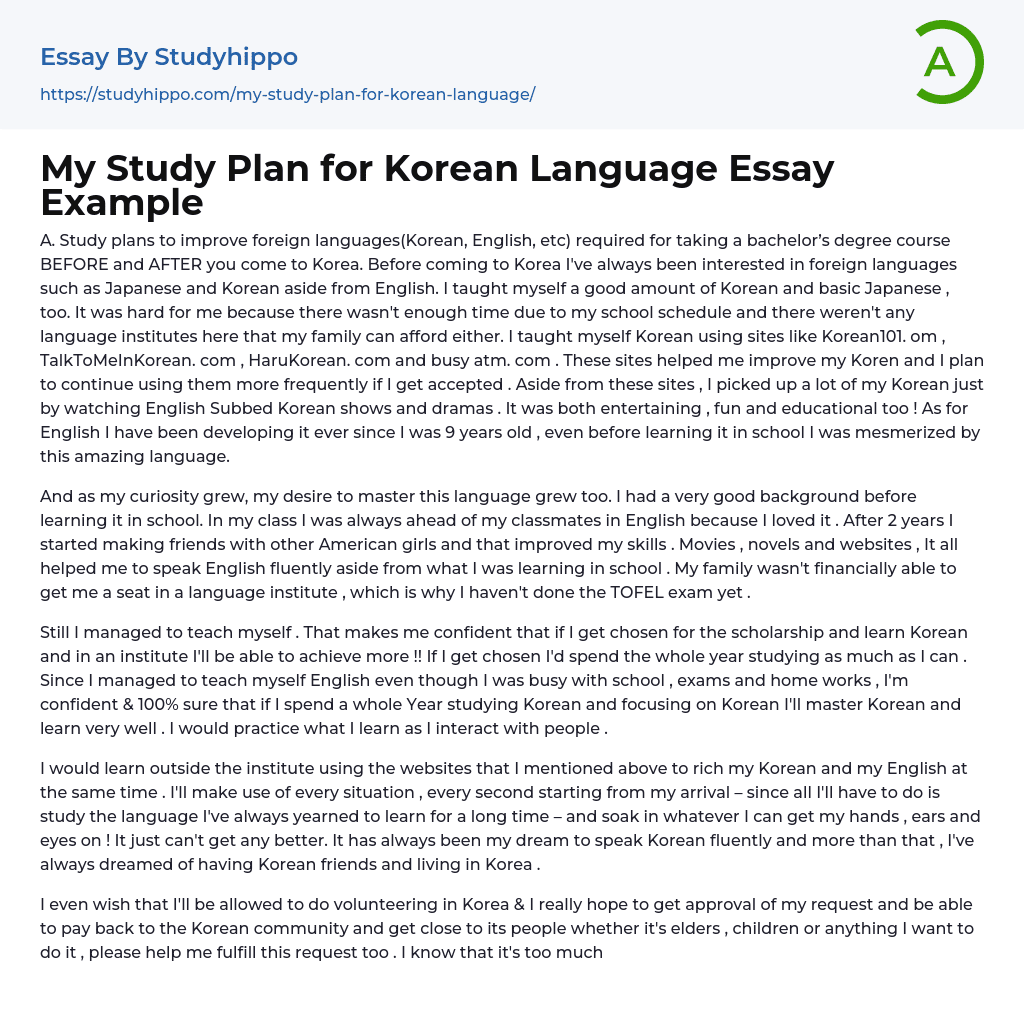
My Study Plan for Korean Language Essay Example
- Pages: 5 (1107 words)
- Published: January 6, 2017
- Type: Essay
A. Study plans to improve foreign languages(Korean, English, etc) required for taking a bachelor’s degree course BEFORE and AFTER you come to Korea. Before coming to Korea I've always been interested in foreign languages such as Japanese and Korean aside from English. I taught myself a good amount of Korean and basic Japanese , too. It was hard for me because there wasn't enough time due to my school schedule and there weren't any language institutes here that my family can afford either. I taught myself Korean using sites like Korean101. om , TalkToMeInKorean. com , HaruKorean. com and busy atm. com . These sites helped me improve my Koren and I plan to continue using them more frequently if I get accepted . Aside from these sites , I picked up a lot o
f my Korean just by watching English Subbed Korean shows and dramas . It was both entertaining , fun and educational too ! As for English I have been developing it ever since I was 9 years old , even before learning it in school I was mesmerized by this amazing language.
And as my curiosity grew, my desire to master this language grew too. I had a very good background before learning it in school. In my class I was always ahead of my classmates in English because I loved it . After 2 years I started making friends with other American girls and that improved my skills . Movies , novels and websites , It all helped me to speak English fluently aside from what I was learning in school . My family wasn't financially able to ge
me a seat in a language institute , which is why I haven't done the TOFEL exam yet .
Still I managed to teach myself . That makes me confident that if I get chosen for the scholarship and learn Korean and in an institute I'll be able to achieve more !! If I get chosen I'd spend the whole year studying as much as I can . Since I managed to teach myself English even though I was busy with school , exams and home works , I'm confident & 100% sure that if I spend a whole Year studying Korean and focusing on Korean I'll master Korean and learn very well . I would practice what I learn as I interact with people .
I would learn outside the institute using the websites that I mentioned above to rich my Korean and my English at the same time . I'll make use of every situation , every second starting from my arrival – since all I'll have to do is study the language I've always yearned to learn for a long time – and soak in whatever I can get my hands , ears and eyes on ! It just can't get any better. It has always been my dream to speak Korean fluently and more than that , I've always dreamed of having Korean friends and living in Korea .
I even wish that I'll be allowed to do volunteering in Korea & I really hope to get approval of my request and be able to pay back to the Korean community and get close to its people whether
it's elders , children or anything I want to do it , please help me fulfill this request too . I know that it's too much to ask but I want to volunteer . I wish that my Korean will help me earn Korean friends . I'd be honored if I get accepted by them and I'll be thankful if they teach me about their country , traditions and morals .
I hope that I can be good enough to get close to them and be worthy enough to learn from them . I'm always willing to try and willing to learn . Having a chance to become a step closer to my dreams , who's crazy enough to mess such an opportunity ! Aside from Korean I want to improve my English . As I taught myself Korean and some Japanese , I came to find my English improving gradually . When watching Korean media ( drama , shows .. etc) I learn new vocabularies in the English subs and after I translate them , I learn the Korean version of the words .
In my first year I'll focus on Korean but I won't forget my English either . I'll make sure to double the educational benefit of the scholarship that I'll receive . If I'll be given the chance to learn Korean , I'll make sure to get the best of what I have and double it up and improve my English and after that I have a new language : Japanese . If I was given the chance to receive a good education I'll make it double and gain
not only education and knowledge , I'll learn experience from everyone around me .
I will make friends with new people that'll be studying Korean with me . Practice both Korean and English with them & exchange culture with them ,too . As I progress in Korean I'll keep up with English . I'm planning on saving up from my allowance – or working part-time job – to be able to pay for the TOFEL and perform the exam , Since I've never been able to do so because I didn't have money . This is only the beginning for me . I want to learn Japanese , Italian , French and Spanish too . That way I'll be able to contact other people. If you talk to a man in a language he understands, that goes to his head. If you talk to him in his language, that goes to his heart" . said Nelson Mandela As a person who's constantly fascinated by languages . I believe that a human being is on a journey of learning as long as he's breathing & never too old to learn . There's just so much to learn from everyone in this world ! by learning new languages I want to get in touch with its people and their minds , their culture and experiences !
My curiosity about the teachings other people carry around the world , fuels my desire to speak their language which will inspire me in my works and enlighten my life and my mind . I believe in myself and in my abilities & I'm yearning for attention , care
and support . I know that if I live in a constructive , educational environment it'll help me sharpen my skills and be a productive promising talent . If I get the chance to be a KGSP student , I will work hard to prove that you chose the right student and do my best to achieve that.
- Is English an Universal Language? Essay Example
- English Proficiency in Philippine Educational Setting: A Theoretical Study.
- Crossword puzzles Essay Example
- Accuracy versus fluency Essay Example
- Autobiography Summary Narrative Essay Example
- Study Plan Argumentative Essay Example
- Study Plan Persuasive Essay Example
- Reasons of Why Tertiary Level Students Are Not Mastering English Essay Example
- Challanges and Issues in Teaching and Learning English Essay Example
- Received Pronunciation Essay Example
- English Language Teaching Methods Essay Example
- Pronunciation Problems in Egypt Essay Example
- The History of Bilingual Education in Texas Essay Example
- Writing has always been a fascination Essay Example
- Plagiarism A Problem For International Students English Language Essay Example
- Academia essays
- Higher Education essays
- Language Learning essays
- Studying Business essays
- Education System essays
- Study essays
- First Day of School essays
- Scholarship essays
- Pedagogy essays
- Curriculum essays
- Coursework essays
- Studying Abroad essays
- Philosophy of Education essays
- Purpose of Education essays
- Brainstorming essays
- Educational Goals essays
- Importance Of College Education essays
- Brown V Board of Education essays
- The Importance Of Higher Education essays
- Online Education Vs Traditional Education essays
- Academic And Career Goals essays
- Academic Integrity essays
- Brown Vs Board Of Education essays
- Distance learning essays
- Technology in Education essays
- Vocabulary essays
- Writing Experience essays
- Importance of Education essays
- Early Childhood Education essays
- Academic Degree essays
- Academic Dishonesty essays
- School Uniform essays
- Academic writing essays
- Cheating essays
- Bachelor's Degree essays
- College Life essays
- Grade essays
- Diploma essays
- Phonology essays
- Sentence essays
- Filipino Language essays
- Pragmatics essays
- Millennium Development Goals essays
- History Of Education essays
- Graduate School essays
- Middle School essays
- School essays
- Special Education essays
- University essays
Haven't found what you were looking for?
Search for samples, answers to your questions and flashcards.
- Enter your topic/question
- Receive an explanation
- Ask one question at a time
- Enter a specific assignment topic
- Aim at least 500 characters
- a topic sentence that states the main or controlling idea
- supporting sentences to explain and develop the point you’re making
- evidence from your reading or an example from the subject area that supports your point
- analysis of the implication/significance/impact of the evidence finished off with a critical conclusion you have drawn from the evidence.
Unfortunately copying the content is not possible
Tell us your email address and we’ll send this sample there..
By continuing, you agree to our Terms and Conditions .
a blog about learning & translating Korean
Tips for improving Korean essay writing

After more than a year of attending advanced Korean classes and regularly writing and reviewing 500-800 character essays with my teacher, I’ve accumulated a few useful tips for improving long-form writing that I thought I’d share here.
I’ll preface this by saying few people write well in any language, even among native speakers. I’m a writer and storyteller in both my professional and personal life and I know just how hard it is to build compelling rhetoric using effective, engaging language on any topic. So, following these “quick tips” won’t make you a good writer in Korean — that will take years of practice reading and writing, just as it would in English. But it may help you get started on the road to sounding more natural.
Caveat : This is only one language learner’s experience (mine) and one language instructor (my teacher)’s advice, so take with a grain of salt.
Master written language
This means practicing and getting comfortable with plain speech. Plain-style Korean, or 해라체, is used in books, newspapers, blogs — basically any form of writing where you’re not directly addressing someone else. For example, you’d use plain style to write a blog post in Korean, but use proper politeness (i.e. -요 or -ㅂ니다) levels when responding to comments. Sentences in plain-style Korean end with -(ㄴ)다 (present/future) or -ㅆ다 (past).
There are a number of useful textbooks out there that cover Korean grammar; I’m personally a fan of 빈도별 토픽 for more advanced learners and the Integrated Korean series for beginners and intermediate learners. When going through these books, keep in mind that not all verb endings are appropriate for written Korean. Endings like -지요 and -잖아요, for example, only make sense when you’re talking to someone else.
Use inductive reasoning
Obviously not a hard and fast rule (depends on the discipline, writer’s style, etc.), but after reading a number of Korean op-eds and personal essays, the biggest difference between Korean and English essay writing that I’ve noticed is the underlying logic of the work.
Korean essays are mostly built on inductive reasoning: they start out with anecdotes, examples, and research to draw the reader step-by-step to the main point of the essay. If you’re reading a long opinion piece in Korean, you might make it through 50% or more before you realize what exactly the author’s trying to say.
This is counter to the typical “five paragraph essay” taught in American high schools, where you’re told to state a main point for each paragraph and then support it with evidence (more deductive than inductive reasoning).
Tip! I’ve found that because of this logic structure, skimming long chunks of Korean prose — especially during TOPIK — is challenging for me. If you’re pressed for time, read the last couple sentences of every paragraph to get a decent tl;dr.
Memorize transition words and phrases
These are words like 그런데, 그리고, 게다가, 반면에, etc., that link one sentence to the next or one paragraph to the next. When you’re reading essays, news articles, or even TOPIK passages, take a second to identify and write down these transition words/phrases. Memorize them and practice using them in your own writing, so you won’t default to the boring ones I listed as examples above.
Put the most important part of the sentence first
One of my favorite things about Korean writing is the flexibility of word order within a sentence. That said, I often get told by my teacher to not be so careless about it when writing essays. A writing tic of mine, for instance, is to include every relevant detail that I possibly can into a relative clause that modifies the topic or subject of my sentence; that means my sentences are “top heavy” with the most important part usually coming near the end. In longer compositions, though, it’s important to make sure your key point shows up at the beginning of the sentence for clarity.
For example, take a look at these two sentences. The first is what I wrote and the second is a revision.
(1) 마지막으로 직장 관련 이야기가 듣기 싫다는 대답을 선택한 여성들에 비해 2배 이상 많은 남성들이 있다는 결과가 나왔다.
(2) 마지막으로, 여성들에 비해 2배 이상 많은 남성들이 직장 관련 이야기가 듣기 싫다는 대답을 선택한 결과가 나왔다.
I was trying to describe that, according to the results of the given survey, more than twice the number of men versus women said they did not want to discuss work [with their extended families during the holiday]. In sentence (1), the key point ‘여성들에 비해 2배 이상 많은 남성’ shows up at the end of the sentence; in sentence (2), it shows up right after the transition word.
Use! The! Right! Particles!!
Believe me when I say that it is worth investing time into understanding the difference between topic particles (은/는) and subject particles (이/가). For a lot of beginners, this is one of the most difficult concepts to grasp, especially if English is your native language. If you’re only writing a couple short sentences at a time, to a limited (!) extent, you can get by mixing up the two without dire consequences.
For example:
(1) 그 남자 는 나를 좋아한다고 고백했다. (2) 그 남자 가 나를 좋아한다고 고백했다.
Both sentences have differences in nuance but more or less mean the same thing.
When sentences get long with different topics, subjects, and clauses, using the wrong particle can really mess up the meaning of your sentence. And when you’re introducing different points in an essay, mastering 은/는 and 이/가 will help direct the logical flow of your writing and lend it clarity. The best way to grasp particles? Write a lot, but don’t just write disparate sentences. Write a paragraph or two on one idea and then have your writing reviewed by a native speaker.
Synonyms are your friend
This is good writing advice no matter what language you’re writing in. No one wants to read the same adjective or verb over and over again, so it’s good to pay attention to different ways to say the same thing. This is particularly important, I think, for the analytical writing part of TOPIK, which asks you to describe the results of a survey or research study. You’ll be using a lot of phrases like “X increased by Y%” or “A decreased by B%” or things like “it was revealed that XX,” “the results showed ,” “the participants chose , ” etc.
Tip! Compared to the longer essay in TOPIK II, the analytical essays are actually where you can improve your score the fastest, in my opinion. One easy way to do that is by diversifying your sentences with different synonyms and phrases related to analysis and trends. On one of my early practice tests, I used the word 증가하다 three sentences in a row — don’t do that.

Last but not least: read actively
An obvious one, but worth mentioning. Now, when I read non-fiction in Korean, I don’t just read for comprehension. I read for writing style. And I mean, I really break down the structure of the composition. I start out by picking out where the main idea shows up in each paragraph and then jot it down. Then I try to pay attention to how the sentences are connected to one another, noting specifically how the author shifts topics and subjects from sentence to sentence and how transition phrases/words help build the logic of the narrative. And then I try putting in any new words and sentence structures/phrases I’ve learned into practice.
In order to build your vocabulary, it’s important to read widely. But in order to become a better writer, I think it’s important to read closely .
Closing thoughts
I think being able to write naturally, using standard grammar, is an important tenet of fluency. But I don’t think you have to be a “good” writer to consider yourself fluent — though, of course, it depends on what your ambitions and/or goals are.
In English, writing is like breathing for me. So it’s important to me that I can write something that would be considered generally good writing in Korean, not just comprehensible or “good for a foreigner.” That’s what I’m working toward, at least.
To that end, I do have a ((new)) blog in Korean, up on the interwebs somewhere. I’m waiting until I write a few more posts before I officially share it here, but if keep your eyes peeled if you’re interested!
Share this:
10 responses to “tips for improving korean essay writing”.
what do you think about the hanguel-only thing as it relates to writing?? do you find it limits your writing ie changing a word because there’s a lot of homophones?
That’s an interesting perspective. I don’t think I’ve ever felt limited by Hangeul as a writer. If I’m worried about being misunderstood because of a homophone issue, I just look up the hanja and put it in parentheses. As a reader, though, I can see how Hangeul might seem limiting, e.g., looking up hanja is an extra step I have to go through to understand whatever I’m reading, or worse, if there is no hanja, I expend more mental energy trying to figure what the author means.
Like Liked by 1 person
also have you noticed bad writing in Korean in korean newspapers, articles etc now that you’re more skilled in writing?? Or are there certain things you see korean writers do that annoy you ??
I was reading the japanese internet about reading korean and of course there’s negative stuff. I would love to hear your thoughts about it. if you use rikai-chan or some pop-up dictionary i’m sure you can understand it… i’ll paste it…
漢字を無くしたから意味を文字で伝えるのが難しい なので平易な言葉で伝えないと読み手に書き手の意思を伝えられない 冗長になり論点がぼけるのはハングルの特徴だから仕方ない
書くための文字→ハングル 読むための文字→漢字
これが言語や単語にまで影響及ぼしてるだけ
++ 南朝鮮の新聞記事は長文駄文意味不明が多いよね 文章「表現力」以前に、思考回路に何かしらの障害がありそう 目の前の事象を「しあわせ回路」や「反日回路」に入力し、「願望」の粉かけて、ビビンパのようにまじぇまじぇしないとあんな文章は出力できないよ
なんかの調査で韓国人は平均IQが高いと言われてホルホルしてたけど (1位香港 2位韓国 3位日本・・・・) IQテストのためのテスト勉強させてる国がどこかにあるとかw IQ高くてもあんだけ非論理的だし 自前でロケットさえ飛ばせない ノーベル賞なんか皆無だし(金で買える平和賞は除く) ああ、むしろIQなんて全然意味ねえじゃんて気づかせられた件でした
++ 韓国の新聞の社説を読んでると、論旨が不明瞭で様々な故事を出した後に何の論理的な展開も無く○○が悪いという結論で終ってる事が多くて何を伝えたい文章なのかさっぱり分からない事が多い。
普通の新聞記事でも、感情的な言い回しが多くて、記者はニュースを伝えたいのか、怒り嘆きを伝えたいのかよく分からない文章になってる事が多い。
そんな文章を日常的に読んでいたら、文章を読むのが苦手になっても不思議ではないし、論理思考が出来なくなっていくのも無理は無い。
++ だからなのか、韓国の新聞て論説委員からして文章力がない。ただダラダラ長いだけで何が言いたいのかさっぱり伝わらない。記事タイトルと書いてる内容がズレてることも多々ある。こんなレベルの低い文章ばかりなのに、読解力を求めらても何の意味もないから、そのままで良いと思う。
+ 韓国の新聞のコラムでも 読みたくなるような、読ませる文章ではないよね。ドヤ顔でどこかの国の引用から始まるのが ほとんど。 ++
童貞 同情 同志 冬至 史記 詐欺 紳士 神社 郵政 友情 首相 受賞 火傷 画像 市長 市場 風速 風俗 映画 栄華 戦死 戦士 歩道 報道 犬喰 見識 日傘 量産 数値 羞恥 お腹 お船 烈火 劣化 主義 注意 読者 独自 団扇 負債 停電 停戦 大使 台詞 諸国 帝国 諸島 制度 声明 姓名 無力 武力 全員 田園 定木 定規 全力 電力 代弁 大便 捕鯨 包茎 地図 指導 素数 小数 対局 大国 誇張 課長 インド 引導 初代 招待 朝鮮 造船 駅舎 歴史 発光 発狂 定額 精液 火傷 画像 反戦 反転 反日 半日 武士 無事 大便 代弁 無力 武力 電車 戦車 連覇 連敗 恨国 韓国 祈願 起源 競技 景気 放火 防火
ハングルでは全部同じ。 同音異義語というのみならず表記も全く同じ。 前後の文脈で区別するしかない。
例: 釣船の操船で有名な朝鮮人たちの祖先が造船した商船に率先して乗船し商戦に挑戦 ↓ チョスンのチョスンで有名なチョスン人たちのチョスンがチョスンしたチョスンにチョスンしてチョスンしチョスンにチョスン
http://u1sokuhou.ldblog.jp/archives/50389367.html
kaikaiの他所でも書いたが、 文章のプロである朝鮮日報・中央日報・等々の文章が下手で驚く。 コラムを書く役職の有る記者ですら、無駄な前振り、論点が行方不明など酷い。
さらに酷いのは新聞記者ではない何かの教授や研究員・学者の類が描く時だ、 目が回るほどに下手だ。 日本のそこいらの素人のblogの方が上手い。
他の国ではそういうことは無い、朝鮮だけの大きな特徴でとにかく文章が下手糞だ。 翻訳の問題ではない。 文章の構成能力や論理的な組み立てが出来てない性質のものだ。
一言で言うと「馬鹿」としか思えない。 いや、馬鹿なんだろう。
62名無し1年前ID:QxMDg2NTE(1/2) >>59 >>58 >>60 向こうの記事読んでそれ感じる。漢字捨てたせいか専門的な単語を使うのにためらうというか使えないというか。そのために意味を分かりやすくしようと変な例えを出してやたら文章が長くなってしまう。 その変な例えの殆どが詩的なんだが自分からすると状況が一致しないか書いた記者自身の文章酔ってるかのように感じてしまい気持ち悪い。
起承転結の起に入るまでが長かったり承が訳が分からなかったり転に至っては絶対間違ってない自信なのか存在しない、それとなぜかなんの脈絡もなく日本が出てきたりと。 ここに来る韓国人の文章は機械翻訳ではあるが変な比喩が無く言いたい事が分かる読みやすい文章なので全然記者よりも文章が優れてるように見える。
i FORGOT THIS この人の発言は、韓国人の文章(新聞記事等)に通じるものがありますね。言い訳と希望的観測を交えて、整合性のない事を平然と悪びれる事なく(息を吐くように)言う。
2018/04/02 [05:52:03] jk 一方、韓国の新聞記事は、的を得ているとは思えない故事や格言、故人の言を引いて、中身の薄い内容を難しく伝える。
Whoops your last two comments got flagged as spam so I’m seeing them just now. Hmm, I wouldn’t say that I’m skilled enough to differentiate between good and bad journalistic writing just yet. I /can/ tell the skill difference between, say, a newbie writer who publishes web novels on Naver and more experienced novelist.
In terms of annoying things Korean writers do… hm… I don’t think I’m widely read enough to make too many sweeping judgments here but I have noticed that in a lot of literary writing, Korean authors tend to use adjectives that are near synonyms of each other, one after the other in the same sentence. e.g. “her face was pale and white” or “the rain fell heavily and strongly.” Sometimes I think the slight nuance helps add atmosphere but when it happens sentence after sentence it becomes tedious to read (and translate). The other thing I personally like in my fiction is varying sentence lengths. It changes up the . cadence of the prose and keeps things interesting. I find that a lot of Korean sentences are similar in length (longggg) one after the other.
Interesting… I’ll take a look at those Japanese comments (let’s see how far I get before the Kanji kicks my ass and I need to use a dictionary lol). Thanks for sharing!
WelL theres lots of cool popup dictionaries to save you time like rikaichan and yomikun.
From my limited experience of reading Korean articles I have to agree with the Japanese people lol. They were just describing what I was thinking but wasn’t confident enough to say since reading Korean isn’t that comfortable at times. Like you I don’t think I’m good enough to decide whether someone’s writing is bad or good
here’s one of the original sites in case you were curious https://kaikai.ch/board/2377/
韓国の新聞メディアや教授のコラムって、その論文全体を通して主張したい1つの軸が不明瞭で、一貫性がなく、要点がないんだよね。 だから「韓国人の書く文章は無駄に長い」「読むだけ無駄だった(重要な事が書いてない)」という感想持つ日本人は多い。
“起承転結”あるいは“起転結” これを韓国人は文章として成立させてない。 日本だと、大学で論文の書き方は骨身に叩き込まれるんだけど、韓国は何をやってるんだろ?
this is post 60 韓国の新聞のコラムとかって 内容の核心に入るまで長くて 余計な知識披露が多い、文字スペース 考えろよ。
they were the posts that post 62 responded too.
I love this! My long term goal is also to write as well and with as much confidence in Korean as I do in English, so this was extremely helpful. Can’t wait to check out your Korean-language blog — I started one a few months ago but only have three posts so far ㅎㅎ 화이팅!
I’m just a beginner but I think these are very valuable advice even for beginners to keep in mind as they progress.
The point about plain style especially hit home for me, because for the longest time I didn’t even know it existed. Every single textbook I have only ever mentioned -이에요/예요 and -(스)ㅂ니다. This made it very difficult to search for anything online as most blogs and websites are written in plain style, and I wasn’t able to read even the simplest stories written in Korean because I was not familiar with the endings.
I wish textbooks would at least mention the existence of this style sooner.
Like Liked by 2 people
I’m so glad found the post valuable, Luna! Thanks for reading. :)
Leave a comment Cancel reply

- Already have a WordPress.com account? Log in now.
- Subscribe Subscribed
- Copy shortlink
- Report this content
- View post in Reader
- Manage subscriptions
- Collapse this bar

Tips for Writing a Good Personal Statement
Study plan for south korean universities.
When applying to study in South Korean universities, you will be required to submit a personal statement or study plan as part of your application. This is your chance to showcase your passion, experience, and goals, and convince the admissions committee that you are the right fit for their program. In this article, we will provide you with tips for writing a good personal statement/study plan for South Korean universities.
1. Be Clear and Concise
Your personal statement/study plan should be clear and concise, and should focus on your academic and career goals. Avoid using overly technical language or jargon, and make sure that your writing is easy to understand. Use examples and anecdotes to illustrate your points and make your statement more engaging.
2. Highlight Your Achievements and Experience
South Korean universities place a strong emphasis on academic achievement and extracurricular activities. Use your personal statement/study plan to highlight your achievements and experience, and explain how they have prepared you for further study. This could include research projects, volunteer work, internships, or other relevant experiences.
3. Demonstrate Your Passion and Motivation
South Korean universities are looking for students who are passionate and motivated about their chosen field of study. Use your personal statement/study plan to demonstrate your enthusiasm for your subject, and explain why you are interested in studying it further. Discuss your long-term goals and how your studies will help you achieve them.

4. Tailor Your Statement/Plan to the University and Program
Each South Korean university and program is unique, and you should tailor your personal statement/study plan to the specific institution and program you are applying to. Research the university and program in advance, and highlight how your interests and goals align with their academic offerings and values.
5. Seek Feedback and Edit Your Statement/Plan
Writing a good personal statement/study plan takes time and effort. It is important to seek feedback from friends, family, or a professional editor, and to edit your statement multiple times. Make sure that your statement is free of errors, and that it is polished and professional.
In conclusion, writing a good personal statement/study plan for South Korean universities requires careful thought and preparation. By following these tips, you can create a statement that showcases your achievements, passion, and motivation, and convinces the admissions committee that you are the right fit for their program. Good luck with your application!
Contact for Consultation
Study in Korea

Visa Requirements for South Korea

Places Where International Students Can Get Help In South Korea

FAQs About Studying in South Korea

Resources to Learn Korean

5 Compelling Reasons to Pursue a Career in South Korea

10 Money-Saving Tips for Students

How Semester Terms and Classes are Structured in Korean Universities

Tips to Achieve TOPIK Level 5 and Above
KoreaAgain(코리아어게인) is the brand of DIOKOS Inc.
Company Registration # : 449-81-03083
통신판매업 신고번호 : 2024-화성봉담-0070호

Key to Korean Motivation & Resources for Learning Korean
TOPIK Beginner Writing Samples (Tests 21-30)
One of the BEST things I ever studied while preparing for the TOPIK test was the sample answers that the TOPIK website provides.
TOPIK-Beginner Writing Topics & Samples (21-30).DOCX
So, I’ve decided to collect ALL the previous TOPIK Writing topics and examples provided by www.topik.go.kr into a single document. However, since there are so many, I’ve decided to split the larger document into 2 smaller parts with 10 previous tests each (TOPIK Writing began from test 10).
Take a look:

Why were these writing samples so great?
Simply, I could see some of the grammar structures and vocabulary that would give me more points on the test if I used them. Take test 29 for example. In the fourth sentence, it says:
시내에는 볼 것도 많고 맛있는 것도 많이 있기 때문입니다.
When preparing, ~기 때문입니다 (because of doing something) was one of the most useful things I learned. I made it my mission from then on to use either ~기 때문입니다 or ~때문에 (because of) in my TOPIK writing at some point.
Take a look also at the second sentence:
저는 운동을 좋아해서 친구들을 만나면 집 근처에 있는 운동장에서 농구 나 축구를 합니다.
The sentence basically says: “Since I like to exercise, if I meet my friends, we like to play basketball or soccer at the playground near my house.”
This is a great sentence to use “since” (~서) and “if” (~면) and “or” (나) and “nearby” (근처에 있는) – or any combination of the four.
Those are just a few examples of the kinds of great grammar structures you can find, learn from, and practice as you prepare for TOPIK. And if you want more help TOPIK Writing resources for Beginners, check out the following:
- TOPIK Beginner Writing Topics & Tips (한국어능력시험 초급 쓰기)
How have the TOPIK sample answers helped you on TOPIK?

Share this:
A note about topik registration in korea.
Warning: TOPIK II test locations fill up quickly! Less than 2 hours after registration opened, I was 17,878 in line. After 5 hours, everything that opened for registration today was full. Be early, or be sorry. (Or wait for IBT TOPIK from 2023.)
120 Days to TOPIK #1 – Gather Resources
Gather your resources! This is one of my favorite parts of any new Challenge because it can be fun to look over the kinds of materials you WANT to use and the kinds of things you WANT to learn (plus, Continue reading 120 Days to TOPIK #1 – Gather Resources
How I Will Study for the TOPIK II in 120 Days (and You Can Join Me)
Well, that was unexpected. I recently wrote a post outlining my plan to cram for the TOPIK II in 30 days. I had been planning to take the test on July 19, 2015. But, I guess plans change. As it turns Continue reading How I Will Study for the TOPIK II in 120 Days (and You Can Join Me)
Leave a Reply Cancel reply
This site uses Akismet to reduce spam. Learn how your comment data is processed .
GKS - Study plan. One year of Korean language course
molly1303 1 / 2 Nov 26, 2023 #1 Language study plan I'm going to split my study plan about the language into two categories, the first one is what i'm doing until i will depart for the S. Korea and the second is what I plan to do with the year of the Korean language course. Before come to South Korea King Sejong Institute online beginner 1A course completed. Following the Sejong 2 online course offered by the Italian - Korean cultural center. I Joined study groups and hired a personal tutor online to practice the language. I listen podcast about korea in Korean and there are some useful channel speaking korean in a beginning level Once the Beginner course is finished, registration for the 95th Topik exam which will be held on July 13-14, 2024. One year of Korean Language Programme 1 semester e 2 semester - autumn - winter 2024 → Topik 2 level 3 Enroll in a Korean Language Institute and continue the learning of the level 1 and begin the level 2 Study new words and practice and interact with native Korean speakers. Partecipe at cultural tour to learn about Korean tradition, Arts, and Culture Join language exchange programs to learn from other students while sharing Italian culture. Interact with Koreans and other foreigners by participating in volunteer activities. At this level: 1. I can express my thoughts during basic conversation/discussion and be understood by native Korean speakers. Discussion of familiar topics employing a vocabulary of about 2000 words. Distinguishing correctly between formal and informal situations. 2. At the end of the second semester I have fully adapted the formal and informal structure of Korean sentences while increasing confidence in conversation with native speakers. Carrying out transactions with people in public spaces and maintaining social relationships. Understanding the correct usage of words and speech. I will have a command of fundamental characteristics of the Korean language. One at a time.

ductam06 3 / 2 Dec 5, 2023 #4 I Joined study groups and hired a personal tutor online to practice the language. I listen podcast about korea in Korean and there are some useful channel speaking korean in a beginning level if it is a plan then u should use future tense, not past like Joined, or at least of u have done one of your task then u should use present perfect: i have ..., further more, it is i will listen to podcast about ..., not i listen podcast about korea.
OP molly1303 1 / 2 Dec 9, 2023 #5 Thanks, it was the first draft so i didn't really put a lot of effort in the grammar side of this essay. I'm going to review and add more specific parts in this essay.

Login to Fasthire
Reset password, create a free fasthire account, how to write a study plan for korea university.
- October 29, 2022
- Education/Study

A Korea University study plan is a significant document that is required for students who want to study at any of the Korean universities . As an aspirant for a Korean institution, your study plan document allows you to talk about your background, academic goals, experiences, and your interest in the study program you are applying for. Just like your Personal Statement Writing , it is one of the documents that make you unique and stand out from other students. Also, it plays an important role in your application process.
In this guide, we will highlight, what a study plan is and how to write a study plan for a Korean university.
What Is a Study Plan?
A study plan is a document that provides detailed information about a student’s study objectives and goals he/she wants to achieve in his/her period of study. It’s one of the important documents which is required by many Korean universities. To make you a good candidate, your study plan should be different and unique from other students.
Many of the students who want to write their Korean university study plan, question how they should write it, what language they need to submit it in, and how long it should be. So, for this sake, we have listed the following general guidelines used for Korea University study plan writing.
Korea University Study Plan Guidelines:
Your Korea University study plan must be written according to the given guidelines:
- You can write your Korea University study plan in either Korean or English language.
- Your study plan for Korea University should not be more than three pages.
- Make sure to discuss the goals that you want to achieve during your study program.
Why Should Your Korea University Study Plan Be Well Written?
The Korea University study plan is a document that plays an important role in the university selection procedure . If your study plan is good and well-written, it can make you a strong candidate for the selection. It increases your chance to study at your selected Korean university.
How To Write a Study Plan for Korea University
The following are the basics of how to write a study plan for Korea University.
- Write about your academic background.
- Discuss your language study plan.
- State your objective and study plan.
- Your plan after Study.
1. Write About Your Academic Background:
Firstly, you should introduce yourself by talking about your academic background:
- What was your initial course of study?
- Why did you choose it?
- What grade did you graduate with?
- What subjects were you most interested in?
2. Discuss Your Language Study Plan:
In this section of the study plan you must discuss some of the important points related to your language ability, especially as an international student:
- Do you have Korean and English language skills?
- How can you improve your Korean language?
- How will you improve your English language abilities?
- What will be your goals for improving your language abilities?

3. State Your Objective and Study Plan:
This part of the study plan talks about your plans regarding the degree program which you want to study. So, in this section you can write and discuss the following points:
- Which university and course program you have chosen?
- Why have you chosen that specific university and course program?
- What will be your academic goals in that degree program?
- How will you achieve your academic goals?
- Write in which major you are going to pursue your degree program.
- What will be your future academic plan regarding your degree program?
4. Your Future Plan After Study:
This section is the last part of your study plan. In this part, you must write about your future after your degree completion. You can write and discuss these points:
- What is your plan after you are graduated?
- Do you want to study for another degree program?
- Will you stay in Korea after your degree completion?
- Will you move to another country after your degree completion?
- Do you want to do any job or internship after graduation?
Read Also: How to Write Personal Statement for Korean University
Some tips to write a good study plan for korea university:.
To write a unique and good study plan as compared to other students, you can make use of the following tips.
- Provide a brief introduction about yourself.
- Make sure you have a list of the academic goals that you want to achieve during your degree program and mention them in your study plan.
- provide a clear view of your study plan by defining your study goals which you want to achieve each year.
- Be clear regarding what your future goals and plan will be once you have completed your degree program.
Key Takeaways for A Strong Study Plan
Ultimately, for your study plan to be as strong as you want, you need to put in time and effort in making research about your school and describe your academic history and goals effectively. To ensure this is done, remember these takeaway points:
- Explain your program fit.
- Be clear and concise but give details where necessary.
- Provide evidence for your claims and arguments
- Reference your research sources.
- Look out for grammatical mistakes and use coherent vocabulary
- Provide relevant supporting documents
- Be direct on your goals.
Writing a good study plan can lead to the beginning of your dream in Korea, so make sure to give it your best. But most importantly, if you do not know how to begin, ask for guidance where necessary. At Fasthire , we believe that to be successful in your application, you need to be well informed. Therefore, we provide information that benefits students and work with clients in providing a good study plan. Do you need a well-written study plan for your university application? Get in touch with us today!
Other Related Articles
- How to Write Personal Statement for Seoul National University
- Seoul National University Personal Statement Sample
- How to Write a Personal Statement for GKS/KGSP Scholarship
- Best Korean Recruitment Agencies That Recruit Foreign Workers
- How to Write Personal Statement for Korean University
- How to Write College Essay for International Students
Share this post
Recent news articles.

How To Stand Out During The Erasmus Mundus Scholarship Application And Interview

How To Apply For The Stipendium Hungaricum Scholarship Online

How To Get The Finland Government Scholarship

How To Win The European Institute Of Innovation And Technology (EIT) Scholarships

How To Become A Substitute Teacher In California 2024

Life In Kuopio for International Students

+2348138235629
For candidates.
- Ghanaian SOP & Personal Statement
- Letter of Recommendation
- Personal Statement
- LinkedIn Optimization
- CV Writing Service
- Login/Register
- Career Advice
For Employers
- Terms and Conditions
- Privacy Policy
- Refund Policy
- Testimonials
© Product of Okverse Services Limited 2020-2023. All Rights Reserved
Click to join the job group

Powered by Fasthire
To write is to redefine, reorganize, and revisit when memories are getting blurred. And of course, to make it less noisy.
A journey to kgsp/gks: study plan.
After a very long while, I finally managed to post this! This, I guess is my final post on A Journey to KGSP/GKS Series. I’m still considering whether or not to make a post about the interview. I’m not sure I can cover this topic well since my experience is limited to the interview session in the Korean Embassy. Even I heard that each Embassy has its own way of conducting the interview, including the questions given. Anyways, on this post, I’ll be sharing on my experience in writing a study plan (or statement of purpose for the Graduate degrees) for the GKS Application. If you just started preparing the GKS Application, you may want to check my previous posts on the guideline to the application forms and personal statement essay or read my experience in applying for the 2016 KGSP/GKS-G .
So, as we’ve known, a study plan is another important stage to showcase the applicant’s ability in planning his study in Korea. One needs to explain his/her plans before coming to Korea when doing the study in Korea, and after graduating from the Korean university.

Study Plan template (2021 GKS-Undergraduate Application)
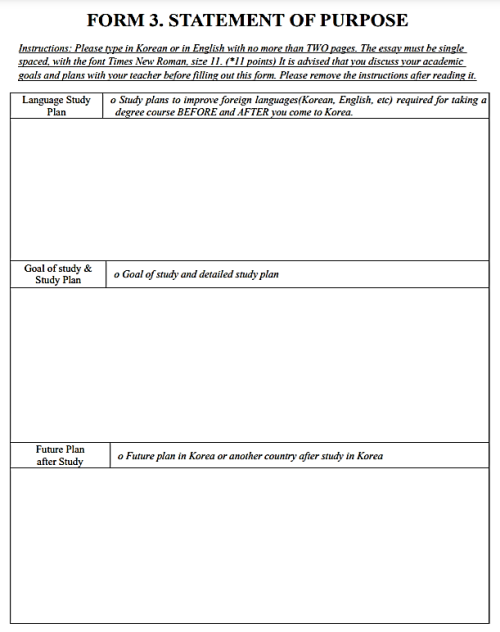
Statement of Purpose template (2021 GKS-Graduate Application)
When preparing for the application back in 2016, I tried to find as many resources as possible. I joined the KGSP Global Applicant Facebook group, searched awardees from Indonesia and other countries online through Facebook and Instagram, and contacted them to discuss their experience and ask for some advice. I then found Mas Nasikun’s blog , a KGSP awardee from Indonesia who did his Master’s degree program at Seoul National University. I was especially very grateful for his posts on how to write a study plan. His posts on KGSP Application are still there and anyone interested in applying for this scholarship will surely find it very useful.
Here I’m making a kind of brief guideline in writing a study plan. I divide them into plans before, during, and after studying in Korea.
Plans before going to Korea. Here, you need to write down things you have been doing and will be doing before going to Korea. This mostly covers Korean language preparation. I believe that ‘taking Korean language courses’ shouldn’t be necessarily on the list. There’s a bunch of fun ways to learn a language, especially the Korean language. What is better than watching Korean TV shows and being whipped by the actors and actresses? (Not watching one?) Okay, if you still doubt whether you should start learning the language by now, I urge you to do so unless you just apply for fun and ‘luckily’ see yourself get a seat at the end. Especially for those who never got anything related to Korea, get yourself used to how Korean language sounds is an important first step that will take you further lightheartedly. I met people who hardly heard the Korean language until they reach the country, and they struggled within one-year language training which I believe could have been less tormenting and fun instead. One year is short if not to say insufficient, trust me.
I was far from fluent when applying for this scholarship program (well, I still am), but I wasn’t unfamiliar with the language either. If there was only one effort in learning the language that I invested the most, it was listening to Korean songs. I wasn’t into K-dramas before coming to Korea, and I could barely make any time to go to a language center. I started learning Hangeul (Korean alphabet) while preparing for the application but just started self-teaching on basic grammars around 2 months before my departure in August. I wasn’t confident in mastering the language in one year, plus my over-anxiety told me to do something to lessen my stress in the future. Still, I knew I should’ve started earlier.
So, you need to explain that any plans during this time are to prepare you for life in Korea and of course the degree program. Here, you also need to mention your goals during the language training program. You may divide it into two semesters; what things you will do and the level of Korean proficiency you aim in the first and second half. There are many programs you can participate in during language training, such as the Buddy program, voluntary work at Korean schools, cultural festivals, etc. You may do your research and mention what you’re mostly expecting to do to improve your Korean skills.
Plans during your study in Korea. This section is a little bit different for GKS-U and GKS-G applicants AND applicants via Embassy and University Track. GKS-U applicants are provided a separate section for this part whereas, for GKS-G applicants, this part is combined with the plan before coming to Korea. Regardless, the best way to deliver this part is by setting a timeline for your plan, either per semester or per academic year.
For GKS-U applicants , I personally think that you can simply mention the number of credits in total to graduate and the average number of credits every semester. As for the course, you can mention some courses you’re particularly interested in and the reason (for example, those courses are in line with the topic interest of your final project/thesis, or they will be beneficial for your future career). These are basic information, so make sure you check the curriculum and graduation requirements! Other things to include are plans on taking short-term courses during summer/winter break and organizations/clubs/other student activities you will want to join (check on the university/department website for reference). Don’t forget to elaborate on why you need these activities (project it to your future goal).
For GKS-G applicants , I recommend writing down your study plan per semester since dividing into two academic years may limit the details. Depending on the major, you may set different goals each semester. Generally, I believe, the first semester would be the time to strengthen your fundamental knowledge regarding your field of study while adapting to the Korean education system. Some may have chances to start consulting with their academic advisor/professor even working in a lab. In the second semester, you may need to start working on your research plans. Here, you may briefly explain the thesis research you want to do. Most Master’s degree programs in Korea require a thesis for graduation so make sure you prepare one. Unless you’re applying for the Research Program, no need to go very detail on this. Three important points to include when explaining your research plan: what the research topic is, why you want to work on it, and why Korea and/or your university choice is the best place to carry out this research. In the third semester, you will probably need to sit for a comprehensive exam and start conducting your research. For social science and humanity students, you should prepare the ethical clearance application by the end of this semester or during the semester break so that you can start conducting your research, especially, collecting the research data, as the new semester begins. Finally, you may wrap up your final semester by completing the thesis and publishing or submitting a research article to a journal (some departments have it as part of graduation requirements).
For Embassy track applicants , I don’t think you need to elaborate on your 3 university and major choices and the reasons behind every choice. You likely apply for similar if not the same major. Despite different names, the focus study should be the same and that’s what you need to elaborate on. What I did back then is briefing the reason I applied for that major (I already mention it in the Personal Statement so I just briefly explain it here) and what topic of study I will focus on my thesis research. For university track applicants , you may explain the reasons for applying to the major and the university of your choice and your study plan followed by the plan each semester.
Plans after graduating from a Korean university. The keyword for this part, I believe, is future career. And the best way to show the reviewer your enthusiasm and your visionary side (regardless of how vague the future life is yet), is to name your future goal. I think telling what kind of job you aspire and some motivations behind it would work. Another important point to include is whether you will return to your home country or stay in Korea after graduation, accompanied by things you will do afterward. Again, this part may seem vague for some, especially for GKS-U applicants. Still, you need to make it as detail as possible, regardless of whether you’ll change it someday in the future or whether it seems unattainable for now. Dream big! If you plan on going directly to a graduate school, briefly explain what motivates you to continue your study and what field of study you’re going for. For GKS-G applicants, I guess their work for this part shouldn’t be too difficult as some are likely to already have a job and/or know where they’ll go after receiving the degree.
I hope you find this post helpful and may as well be a reference for writing your study plan. Best of luck with your GKS application and your study in Korea.
- korean government scholarship program
- global korea scholarship
- studyinkorea
- Korean Scholarship
- scholarship for graduate programs
- scholarship for undergraduate programs
- student life
- university life in korea
- 3 years ago with 56 notes
- ')[1].split(' ')[0]; if(window.tumblrNotesLoaded)if(tumblrNotesLoaded(notes_html)==false)return;var more_notes_link=document.getElementById('more_notes_625473194547167232');var notes=more_notes_link.parentNode;notes.removeChild(more_notes_link);notes.innerHTML+=notes_html;if(window.tumblrNotesInserted)tumblrNotesInserted(notes_html);}};tumblrReq.open('GET','/notes/625473194547167232/eWqk9wz1p?from_c=1630092349&large=true',true);tumblrReq.send();return false;">Show more notes Loading...

- LEARN KOREAN FROM ZERO
- INTRODUCTION TO TOPIK
- TOPIK IBT – COMPLETE GUIDE
- REGISTER FOR TOPIK TEST
- TOPIK 2024 SCHEDULE
- CHECK YOUR TOPIK RESULT
- DOWNLOAD PAST PAPERS
- TOPIK MOCK TEST
- TOPIK PREP CLASSES
- KOREAN GRAMMAR COURSE
- TIPS & RESOURCES
- LATEST CONTENT
- TOPIK UPDATES
- KOREAN LEARNING TIPS
- KOREAN GRAMMAR
- KOREAN VOCABULARY
- SCHOLARSHIPS
- STUDY PACKAGE

The Only Guide You Need to Pass TOPIK Test
Best Self-Study Material to Prepare for TOPIK Test

How to Set Realistic Language Learning Goals
- Make Realistic, Achievable Goals – I don’t want to sound like a pessimist but the biggest reasons why we are not able to stick to resolutions is because they are not realistic. ‘I will become fluent like a native Korean this year’ is not a very practical goal as achieving native level fluency takes at least a few years if not decades. Instead something like ‘I will study and pass TOPIK level 2 or 4 this year’ or ‘I will read 1 Korean news/article/story every week’ is a realistic goal. The more realistic your goals are, the higher your chances of achieving them will be.
- Make Specific Goals – Saying that you will improve your speaking or writing skills in Korean is a great resolution but making the goal more specific will be better. Your goals should be easily trackable and in order to track the progress, you need to have very specific goals. Good examples can be – ‘I will write one Korean essay every week and will get it checked’ or ‘I will do a 10 minute conversation in Korean with a friend everyday’ or ‘I will pass TOPIK level 3 by October’ or ‘I will finish Korean level 4 textbook by June’.
- Divide Goals into Big and Small Ones – Making a big goal – like passing TOPIK level 5 or 6 – by the end of the year – is fine but you will know whether you achieved it or not only when the deadline is already over. You have no way to track your progress and change strategies in between. Dividing big goals into smaller once will make it easier to track and achieve them. For example, you can divide the goal of ‘passing TOPIK level 5 or 6’ can be into smaller goals like – 1. Make a list of important grammar patterns in January 2. Study the grammar patterns and solve one TOPIK paper every week in February 3. Do more listening practice by listening to 5 minute of Korean audio every day and so on. These small goals can be tracked continuously and if needed the plans and strategies can be changed accordingly. Also when you achieve these small goals, it will give you a sense of achievement and will keep you inspired and motivated.
- Decide HOW You will Achieve the Goals – Just deciding what you want to achieve is not enough, you will have to determine how you plan to achieve it. For example – instead of ‘I will learn 10 words everyday’ you should write ‘I will make a list or flash cards of 10 words from my Korean level 3 textbook, memorise them and practice by making one sentence each’. Be as specific and clear as possible so that later you can just start working on the tasks rather than wasting time on thinking how you should go about doing them.
- Decide how you will Monitor your Progress – Testing yourself and keeping a track of your achievements is very crucial. You need to set several milestones where you will examine if you have successfully learnt what you had planned to learn or not. The test can be done through some pre-made test papers, with the help of a teacher or friend, using online mock tests or by assigning a task (like making a video in Korean or writing an article in Korean) to yourself. Keeping a record of your test results will keep you motivated and will help you adjust your methods, routines and goals. You can also let a friend know about your goals and ask him or her to monitor and test you. Some people also announce the goals on social media and use the self-built pressure as a catalyst.
What are your language learning goals this year and how are you planning to achieve them?
Dr. Satish Satyarthi
Satish is the Founder and CEO of TOPIK GUIDE. He is passionate about languages. He created TOPIK GUIDE website to help Korean language learners learn Korean effectively, succeed in TOPIK test and achieve their goals. He has a PhD in Korean language. His research area has been 'Teaching Korean as a Foreign Language (외국어로서의 한국어교육)'. He is a Seoul National University (GKS) alumni. He has been active in Korean language teaching and research for more than 10 years. We are a team of passionate researchers from Seoul National University specializing in Korean language and linguistics. We are committed to helping international students prepare for the TOPIK test. You can connect with us on Facebook , Twitter , Google+ or YouTube
What a great list of tips! I’ll definitely do that and am hoping to pass my first TOPIK test this year! 🙂
All the best, Linda. Thanks for stopping by. 🙂
Session expired
Please log in again. The login page will open in a new tab. After logging in you can close it and return to this page.

Koreabridge

Korean Language Study Methods and Plans
If you’re looking for some Korean language study methods , then you’ve come to the right spot!
In this article, we’re going to show you how to choose the best course and get some serious Korean skills.
Let’s get to it!

When using this guide, you can read through it from start to finish, or jump ahead to the area that interests you most.
How to Use This Guide
We’ve done our best to make this guide as comprehensive as possible, but you may not need to read all of it! The main goal should be to cover four simple steps:
- Specify goals
- Pick a strategy
- Choose content
- Evaluate effectiveness
Let’s do this!
Specify Korean Language Goals
The million-dollar question is: Why do you want to learn Korean?
You should have a specific idea of what you want to do with the language. Once you know this, you can choose your strategy.
For instance, maybe you just want to use Korean to speak with close friends and have conversations. In that case, your strategy would be to concentrate more on everyday listening and speaking practice.
Or maybe you want to become a document translator for the sports industry. In that case, you’d want to focus on reading, writing, and vocabulary that are geared towards sports.
In any case, when you have a goal in mind, you can go through the process of making it more specific. It will only help you succeed in the end!
Here are some killer goal examples:
- Have a 10-minute conversation with a native Korean about Starcraft within 6 months
- Read the full “Deathnote” series of comic books and understand 80% of the content
- Order makgeolli at the neighborhood restaurant and buy a round of drinks for friends
- Marry your Korean partner and speak Korean to the in-laws at the wedding next year
- Watch an episode of Pororo without subtitles
- Understand all the lyrics to your favorite KPOP album by the end of the year and be able to translate them into English!
- Before departing for Korea, be at the point where you’re able to comfortably order in restaurants, take taxis and go about daily errand while conversing only in Korean
- Sing a full song in Korean at your next company outing with the boss

Pororo hopes you can watch his show without subtitles someday! Photo: Republic of Korea
Do any of these sound familiar to you?
Each of these goals is very different, but they all have one thing in common: they are SPECIFIC!
Why don’t you take a quick second and write down your goal for learning Korean? Use this template.
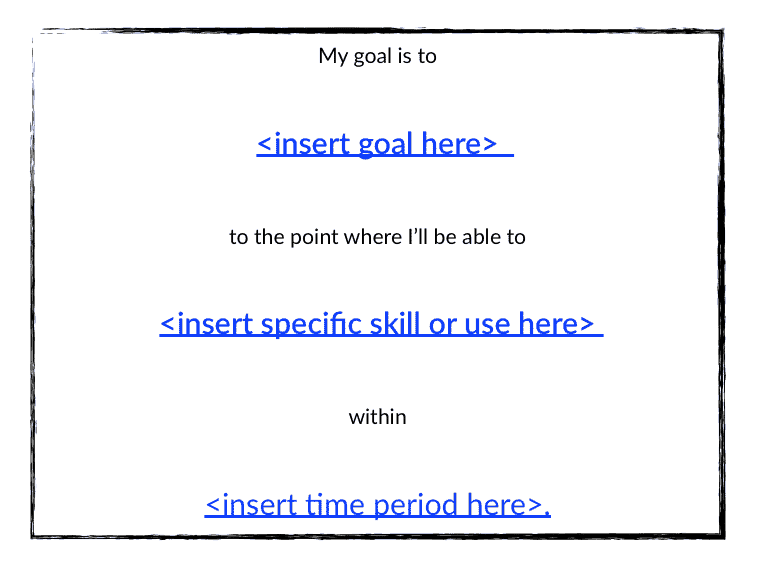
Here’s an example of this template in use. This might be a good goal for a movie lover:
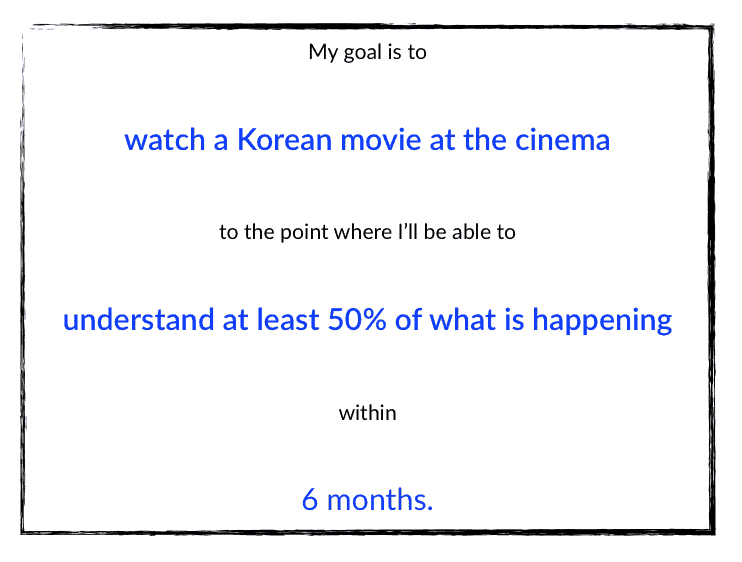
The good thing about this goal is that it’s clear and specific. You have an end in mind, and a deadline to get there. This will help you smooth out those peaks and valleys of language learning motivation.
Pick a Learning Strategy
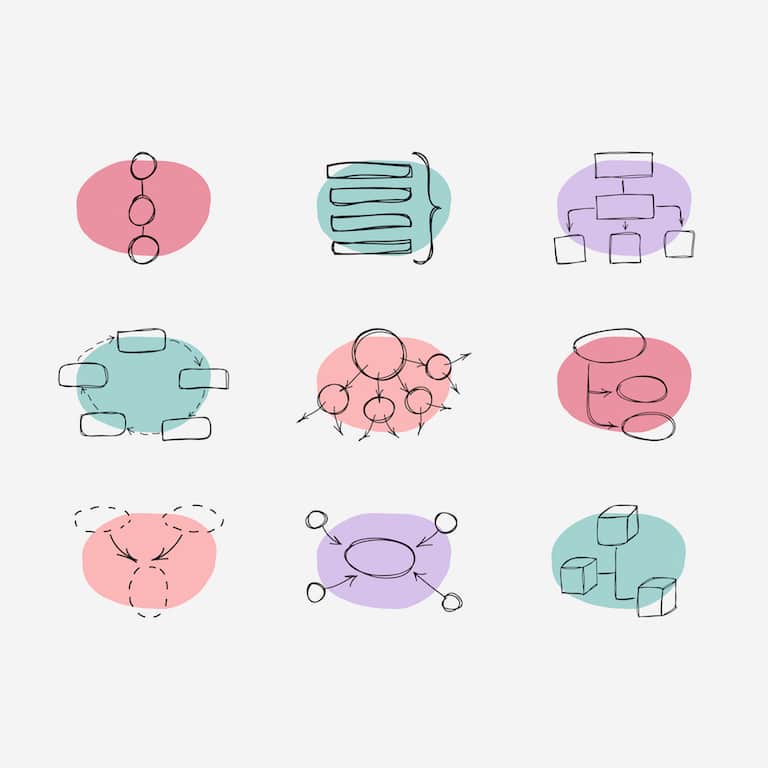
Now that you’ve got a goal in mind, it’s time to pick out a strategy.
Your strategy should lead you to your goal through a clear path. It is the set of actions that you will take each day to get you to where you want to be with your Korean skills.
Here are some examples of questions you may want to ask yourself:
- Do you need to learn formal vocabulary?
- Will slang be useful for you to study?
- How good does your writing need to be?
The good news is, some Korean courses already have a strategy. In that case, you need to decide if it will work for you. You may only need parts of that strategy, or you may have to combine multiple strategies.
To highlight this, we’ll look at two example situations:
Let’s say your goal is to read a “Deathnote” comic book (#2 above). In that case, your strategy isn’t going to require you to learn a lot of academic vocabulary and grammar.
You also aren’t going to need to a lot of speaking practice since you’ll mainly be reading comic books. If you want to fast track your studying, you’ll want to either find or design a program that will get you up to speed with comic book lingo as quickly as possible.
In that case, a Korean grammar course with an additional stack of comic book-heavy vocabuarly flash cards will be a solid strategy.
Let’s try another example situation. In this case, you want to be able to go throughout your normal day only speaking Korean (#7 above). You’re going to need speaking and listening skills
Think strategy here. What kind of language will be necessary to talk with Koreans in everyday situations?
When choosing what to focus on for listening and speaking, you can use the 80/20 Principle.

These pea pods use 80/20 all day long Photo: Isabel Eyre
The 80/20 Principle is a law written by Vilfredo Pareto, where he showed that 80% of the wealth in a given society was held by 20% of the population. The law was also found to hold up in areas outside of economics. For example, Pareto noticed that in his garden, 80% of the peas were being produced by only 20% of the peapods. Or you might notice that 20% of a language is used 80% of the time.
The 80/20 Principle in general can be summarized as: 80% of the results come from 20% of the effort.
Therefore in language learning, you can select the most important and relevant materials and focus on the 20% that give 80% of the results.
To get to your goal of doing daily errands and routines in Korean, applying the 80/20 Principle to the material you choose will move things along nicely.
Think about it. In English, about 300 words make up about 65% of the spoken language. The same thing goes for Korean! Find the most commonly spoken words and move ahead confidently with your strategy.
Matching your strategy with your goals will make life a lot easier for you.
With a goal in place and a strategy ready to implement, we’re ready to look at the various types of Korean language learning content available.
Choose Korean Course Content
Goal. Check!
You know where you want to be.
Strategy. Check!
You know what plan of action will get you there.
Next, let’s talk about choosing the right Korean language content. This is a hugely critical piece of the puzzle. The content should match your strategy.
Without the right choice, we’re often unhappy with the results. One year of studies could pass by and we’d still be unable to do much of anything useful in Korean!
One of 90 Day Korean’s students came to us because he wanted to learn to speak. Previously, he had been studying Korean at a famous university in Korea (KAIST) for a year. He had even passed the Level 3 Korean TOPIK exam.
The problem was, even after all of that studying, he could barely muster a word at our meetup!
When he did speak, he was only able to toss in a word here and there– it was as if he couldn’t figure out the proper way to say what he wanted in a Korean sentence. All those months of academic study had gotten him to into his head and he wasn’t able to use what he knew. When asked why he decided to take the TOPIK exam, it was clear he didn’t need it for any specific reason. He just wanted to be able to speak Korean and thought that would help get him there!
Don’t leave your Korean study content up to chance! Photo: clry2
How about one more example?
Have you ever heard someone who is using English as a second language use a sentence like this in English?
“Yes, that time would be appropriate for me ”
What he meant to say was:
“Yes, that time would be good for me ”
Most people would probably use the second one in English, instead of the first. It sounds more natural. But there are times when you would use the word “appropriate” in order to be more precise.
Do you need to learn the word “appropriate” in Korean? Well, that depends on what your goals are.
The moral of the story is that the Korean language learning content you choose should match your goals and strategies. Simple as that!
If you do opt for free Korean courses, make sure you follow one that follows a solid strategy. Don’t hop around from site to site! If there is no course outline provided, perhaps you could interview some friends and come up with an outline for yourself based on what they think is most important.
There is so much information on the Korean language out there to sort through, and it’s hard to figure out what you need if you’re not familiar with the language. For motivation’s sake, it’s important to get it right early on.
Make sure that whatever content you choose, it should fit in with your strategy and goals.
Knowing that, let’s get right into the different course types so you can make the best choice. While some of these options are only available to those living in Korea, you may be able to find alternatives or language classes in your area.
Let’s jump right into it!
TOPIK Korean Proficiency Test
One strategy for studying Korean is preparing for the TOPIK. It stands for “Test Of Proficiency In Korean”.
It sounds quite formal, doesn’t it?
Well, that’s because it is!
The TOPIK is a serious test. For most Korean language learners, preparing for this test isn’t their idea of “fun”. It’s a rigorous and intense exam focused on grammar, listening, reading, and writing.
What about speaking, you ask?
There is currently no speaking portion to the TOPIK.
Make sure you plan your Korean study accordingly!
So why would someone plan to take a test like the TOPIK? There are plenty of good reasons. Let’s go over a few:
- To work at a Korean company
- To attend a Korean university
- To become a Korean resident
- To have some kind of study structure
- Bragging rights
- Rate their Korean skills
- Love for test taking
You can study at Sogang University after you pass the TOPIK! Photo: George Fox Evangelical Seminary
Now that you know some reasons why people take the TOPIK, let’s take a look at the test structure in greater detail.
As you can see in the chart below, there are two different TOPIK tests (TOPIK I and TOPIK II). You’ll take one of the two tests, and be graded according to your score from those tests.
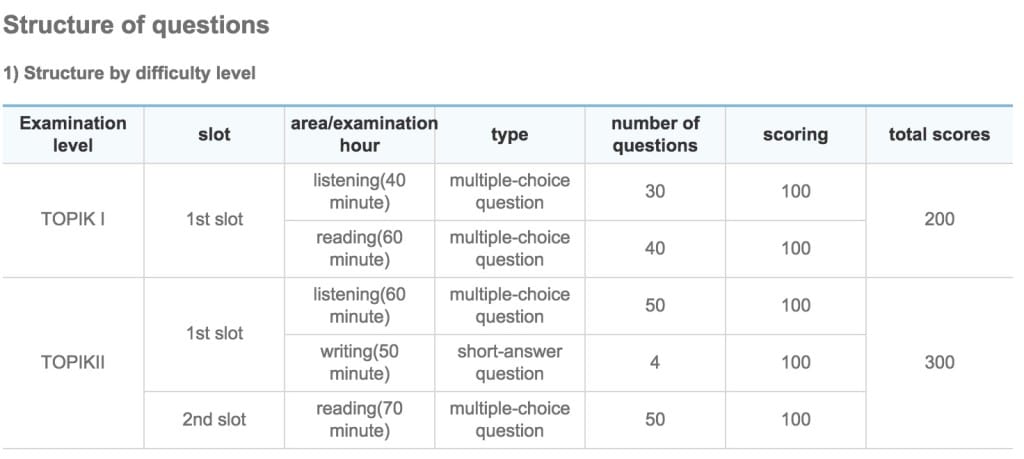
TOPIK Structure Source: TOPIK website
Based on your score, you’ll receive a certificate for one of the six evaluation grades below.

TOPIK Scoring
You’ll need to sign up for the TOPIK ahead of time. Registration typically opens 1 – 2 months before the actual test date. Here is the example of the exam schedule for 2015.
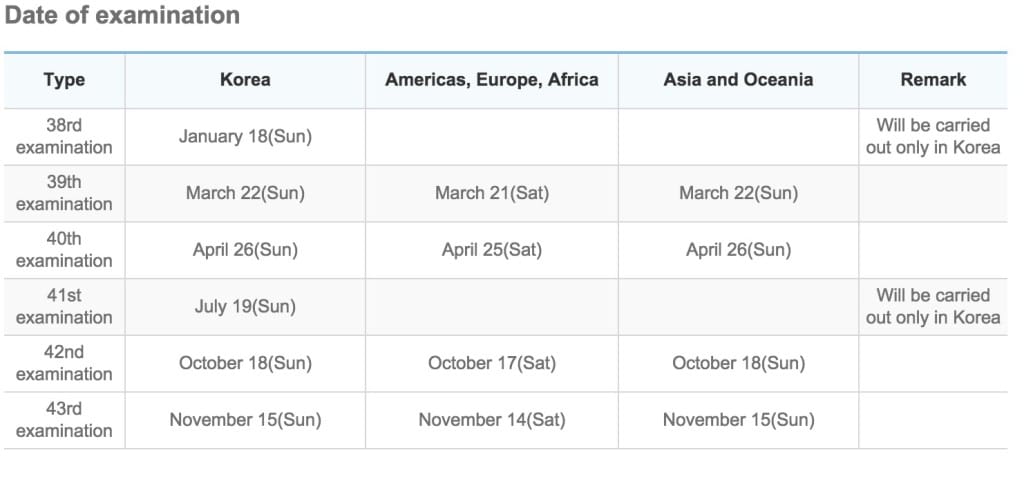
TOPIK 2015 Schedule
For those of you who are impatient, you’re not going to like this news! Test scores are announced 1 – 2 months after the test is completed. The results for tests that are offered in Korea only are announced sooner since there is less to grade. Try not to think too much about it!
If you want more detailed information, stop by their site at www.topik.go.kr .
So you’re probably wondering why the TOPIK is listed as a way to learn Korean.
Well, it’s not exactly a course in itself.
However, keep in mind that the TOPIK does follow a structure and format. Some people use this as a guideline for what Korean they should learn. You can download previous tests for free and study the reading, vocabulary, grammar, listening, and writing.
There are also numerous textbooks, online courses, university prep classes, and academy courses available to help you prepare for the TOPIK.
A word of caution about using the TOPIK as a Korean study plan. It’s dangerous to use the TOPIK as a default strategy if you haven’t outlined your goals. The reason is, some of what’s studied in the TOPIK won’t be used in your daily life. If that’s the case, you’ll feel like you’re learning efforts are a waste of time. Likely you will become less motivated and give up on Korean.
It’s much better to figure out what you want in the end, and then make sure the TOPIK is going to get you there.
Overall, if you love the challenge of a test or you want to make Korea more of a permanent home for yourself, the TOPIK may be the right move for you.
What are your reasons for studying for the TOPIK?
Onto our next study method!
University Courses
For students in Korea who want to learn Korean, studying at a university is one of the options available for those who want to dedicate a large amount of time towards studying in a structured way. Depending on the course, students can apply for a C-3 (short term study) visa or a D-4 (general student) visa and get ready to hit the books!
Advantages of Studying at a University
The main advantage of studying at a university is that it provides structure and focus. Trying to learn a language in the evening after work is difficult for a lot of people as they are often tired and just want to relax, or they have other plans that get in the way of language studying. This applies to people who study on their own and also applies to students who take an evening course.
Studying at a university also allows you to dedicate a large amount of time to studying a language and the quality of education is normally higher than it would be in other cases. If you have a great private tutor for 1:1 studying, then you are very lucky. Finding a reliable and effective private tutor or a quality free course can be very hit-or-miss. At a university, it is quite possible that your teacher is one of the leading teachers in Korea and it is almost certain that they are highly qualified and experienced.
Studying at a university also helps you meet other like-minded people who can help you practice the language outside of the classroom. You will also make some great friends! Your classmates can give you more confidence as you will hear them trying and making mistakes. This means you will have less pressure than if you are talking with native Koreans where you might sometimes feel as though every mistake is being scrutinized.
Disadvantages of Studying at a University
Cost is a major factor as not only do you have to pay the tuition fee, but also you forego earning any money while you are studying. This can make studying for a prolonged time very expensive. Working on a student visa is prohibited unless you have been a student for longer than six months so even getting a part-time job may not be an option.
As your class will be made up of other students, you might pick up some of their bad learning and speaking habits which can hinder your progress when you learn Korean at a university. However, this point can be negated by ensuring that you practice speaking with a native Korean regularly outside of class to correct your mistakes. You can also mitigate this problem by sitting next to students who are of a different nationality than you as they are less likely to make the same mistakes (sitting next to Japanese students is a good idea as they usually have clear pronunciation and Japanese grammar is similar to Korean grammar).
How to choose a university
Cost is a factor, but most universities charge a similar price for their programs. Location and the program’s length and start dates might also limit your choices. The focus of the program is also important as some programs are more focused on speaking (such as Sogang University) whereas others are more focused on grammar which may be more useful if your reason for studying is to pass the TOPIK exam.
Reading the university websites might not provide you with much more information than the general course curriculum so visiting the university, getting feedback from other students, and trying to get a feel for the university will help you decide which university is best to study at. If you are not in Korea then try looking for student reviews on youtube ( such as this one about Yonsei and Ewha Universities ).

Listen to people’s reviews of universities in Korea, such as Ewha Women’s University
The quality of the books that are used is important and can also be a good indicator of the quality of the course. If the program hasn’t been updated for ten years then it might not be the best place to study, and it might not have the most motivated teachers. In other words, if you see an old DOS-based Windows computer with a green screen on the front cover of the class textbook, then run for your life!
As the atmosphere is very important when studying, you should definitely try and find a university that matches your personality and language goals if you want to succeed on your university course.
Hanguk University of Foreign Studies (HUFS)
Hanguk University of Foreign Studies (Known in Korea as 외대) is well known for its language programs, so it comes as no surprise that they also have a Korean language program. Their courses have six levels and run in the mornings from 9 a.m. until 1 p.m. Fees may be wavered for exchange students.
Sogang University

Photo: George Fox Evangelical Seminary
Unlike many of the other Korean Language programs, Sogang University ’s program concentrates on speaking Korean. There is the option of taking a morning 4-hour Korean class, an afternoon 3-hour Korean class, an afternoon 4-hour Academic Korean class, or an evening class. The 4-hour morning class comprises of one hour of writing, two hours of speaking, and an hour of listening/reading, but the listening/reading classes also contain a large amount of speaking. The 3-hour afternoon program is essentially the same but without the writing class.
There are six levels and from levels two upwards there are also optional free classes to take for students studying in the morning classes. Due to the focus on speaking, students transferring from another university may find themselves in a lower level than expected if their speaking is not strong enough. Terms are ten weeks long. To learn more about studying in Sogang University you can watch a series of videos here .
Sungkyunkwan University
Rather than using the regular four hours a day, ten weeks a semester system, Sungkyunkwan University ’s program tries to squeeze six semesters into a year by making their semesters eight weeks long with five hours of study every day. For students who want to learn Korean quickly, this might be a good option although studying for five hours a day could be quite exhausting.
Seoul National University (SNU)
SNU has six levels and each semester is ten weeks long. SNU runs morning, afternoon, and evening classes. The morning and afternoon programs are both four hours long and the evening program is just six hours per week. It consists of three hours of study on a Monday evening and three hours of study on a Thursday evening.
Yonsei University
Yonsei University has a six-level pathway and an eight-level pathway. The eight level pathway is recommended for native English speakers and goes at a slower pace, only covering eight units per semester as opposed to ten units in the six-level pathway. Yonsei has a morning and an afternoon program, both of which are four hours long per day. There is also an evening program that is ninety hours long per semester, consisting of three hours of study a day on Mondays, Tuesdays, and Thursdays.
Busan University of Foreign Studies (BUFS)
If you want to learn Korean in Busan then it is possible to study at Busan University of Foreign Studies . The regular program is only available in the morning and, like most of the other university programs, has six levels, four hours of study a day, and ten-week long semesters.
Other Universities in Korea
Many other universities in Korea have a Korean language program, you can find a complete list of the courses here .
University Courses in your home country
It is often possible to study Korean in your home country if you are outside of Korea. Looking at universities that are noted for their Korean Studies programs would be a good place to start. Within the U.K., The University of Sheffield and the School of Oriental and African Studies are regarded as good places to learn Korean.
Academy Courses and Private Tutors
There are several academies (학원) that offer Korean courses in Seoul and other large Korean cities. These courses are generally held in the evening (although it may be possible to study at the weekend). Different academies offer different courses such as general conversation, business Korean, and TOPIC preparation, so it is possible for students to choose a program based on what they want to study. Edukorean , Metro Korean Academy , Ganada , and Seoul Korean Language Academy are just some of the academies that teach Korean.
Studying through a private academy can provide structure to your language learning and help motivate you to study Korean on a daily basis. The downside is that the courses are often expensive and studying in the evening after work can be quite tiresome. The focus of the course may not suit your needs and if there are not enough students then courses could be cancelled suddenly.
Another option is paying for a private tutor to help you learn Korean. Private tutoring rates are usually not much more than academy courses and you can tailor the studying to your needs. Using a private tutor also gives you more speaking time per hour so can be an effective way to improve your speaking ability. However, the quality of a private tutor can be hit-or-miss and your study may lack structure, even if you are using a textbook alongside the private tutor.
If you don’t live in Korea then you can find a private tutor online. One website that allows you to find online tutors is italki which allows students to find tutors and have a lesson over the internet. This allows students to get plenty of speaking practice even if they are not in Korea.
Free Classes
The obvious advantage of free classes is that it is cheaper than studying at a university or academy. The only costs involved in free classes are the cost of textbooks or photocopying costs. The quality of the teaching varies dramatically from class to class. Although it is possible to find a free class with a great teacher, it is also possible to find one with a really poor teacher. Equally, the quality of the materials used can be very different depending on the class. If you can find a free class that has an enthusiastic teacher who encourages participation then such a class may well be better than some of the fee-charging classes available.
Within Seoul, there are free classes provided by Kongbubang , Sookmyung Education Volunteers , and Conversational Learning Seoul . These classes are all run by enthusiastic volunteers and all have different levels starting at total beginner. These can be a good place to learn the basics of Korean and meet new people as the teachers are usually more willing to interact with the students outside of class (like having lunch together) than teachers on paid courses may be. Kongbubang and Sookmyung Education volunteers are based near Sookmyung Women’s University in central Seoul. Conversational Learning Seoul is based in Gangnam.
There are also free classes run by the Korean government such as the classes at the Seoul Global Center and the Korea Immigration and Integration Program (KIIP) . These classes may be more structured and the KIIP course is also useful for those students pursuing a permanent residency (F-2) visa. The Seoul Global Center offers regular language classes, TOPIK classes, Storytelling classes aimed at mothers and children, and business Korean classes for advanced students. The YWCA also offers free Korean classes aimed at helping spouses of Koreans integrate with Korean society.
Paid Online Courses
When there are so many free resources online, some people might question the logic of paying for an online course. However, a lot of the free online content has been put together by people as a hobby and free resources often have glaring holes in the contents covered.
Paid online resources have the advantage of having structured content that is well organized. This makes learning far easier and more efficient than trying to use free resources to patch together a comprehensive program by yourself. By using a structured course, it is easier to motivate yourself as you can see the progress that you are making. Paid courses also have generally better quality resources than the free resources available.
Studying online has several advantages and disadvantages when compared to studying at an academy or university. While still being structured, online students can study at any time that they like, which is useful for busy people or people that don’t wish to leave their jobs to study full-time. It is also cheaper than studying in a classroom. However, many online courses lack interaction that is necessary for improving one’s language ability.
When choosing an online course, one of the most important factors to consider is how the course will help you with practicing speaking the language. Many online courses have lessons based around podcasts which people assume that they can use to study while travelling or doing another activity. However, to get the most out of any studying, students need to be focused on the activity of studying, use any available supplementary materials available, and take their own notes. When choosing a course, students should also try to judge from the content how long it will take them to learn the language using the course and decide whether this learning speed is appropriate for them.
Another, often forgotten, benefit of paid courses is that the act of paying in itself can provide students with motivation. Knowing that they would be wasting their money if they dropped out of the paid course can help provide a stick to incentivise students to continue with a language once they have started a paid course.
Accelerated Online Courses
Some people claim that they can learn a language in three months and Tim Ferris claimed that he learned Spanish in only eight weeks. How is this possible? The idea behind accelerated courses are that you learn the key components of a language first and try to learn the words that will allow you to say the most about of things in the shortest about of time. In such courses, things like modal verbs (want/can/may/need/like) come up very early on compared to traditional online courses. Other less useful things like describing the weather (which is only really useful if you are either a weather forecaster or if you are British) occur much later on in the course (if at all).
To give another example of this approach there are thousands upon thousands of Japanese Kanji but they are all made up of just over a hundred radicals. An accelerated approach to learning the Kanji would first involve learning these radicals, then learning only the most common Kanji, trying to make sure that students use these a lot until they are fluent. In Gabriel Wyner’s book Fluent Forever , he discusses this use of the most common words in depth, as well as presenting several methods to guarantee that difficult words stay in the student’s memory.
Accelerated Korean courses help you get there faster
The use of accelerated learning techniques is revolutionizing how people think of language learning. It has changed the lives of countless people who thought that they couldn’t do languages because they failed high school French, only to go on to become fluent using accelerated learning techniques.
However, both Fluent Forever and Fluent in Three Months focus on techniques that are useful for learning European languages, and many of the techniques used have massive failings when coming to learn Korean. For example, Wyner’s list of three-hundred words to learn first is completely different from the three hundred most commonly used Korean words, and the sample sentences that Tim Ferris uses to deconstruct languages fall apart when used on Korean due to their inability to factor for the different politeness levels and use of hierarchical pronouns in Korean.
For students wishing to try and use the accelerated method for learning Korean, a course focused on the unique aspects of the Korean language, such as 90 Day Korean’s web course , can allow students to learn the language in a very fast time. However, they should try and combine this with as much speaking practice as possible to maximize its effectiveness (see the language exchanges section for ideas on how to manage this if you don’t live in Korea).
The difficulties in knowing where to start when learning Korean make Accelerated Language Courses an incredibly useful tool when learning Korean. For example, most Korean textbooks introduce the 입니다/습니다 concept very early on, when it is only really used for news, presentations, job interviews, and in the military.
If you don’t need to do a job interview in Korean, you may be able to cut down on your study time!
Beginner students of Korean are unlikely to encounter many of these situations early on in their language study. By using an accelerated course, students can learn the most necessary parts of the language first which can make the task of language learning far less daunting.
Free Internet Resources
There is a saying ‘you don’t get anything in life for free’. The internet may be doing everything in its power to prove that saying wrong, but when it comes to language learning, it still applies to some extent. Free internet resources can help provide extra resources that benefit students if used properly, but they can hinder students who use them as a sole method to learn Korean from.
Free internet resources fall into two main categories: free courses, and other resources. Free online courses are provided by some Korean universities such as Sogang University and Seoul National University.
Although Sogang University is highly regarded for its offline Korean language program, its free online course looks severely out of date and doesn’t provide the interaction and speaking focus that its offline program is famous for. The main problem with the online course is the lack of output that a student is able to make, so it is hard to practice using the content that is being studied.
Seoul National University’s online program, Click Korean , is more user-friendly than the Sogang online course and has more opportunities for students to check their understanding, but it lacks opportunities for students to produce sentence length output and be creative with the language. Students will also probably have to go back over the materials several times before they fully understand it. The University of California: Berkeley also has an online course although it is only available at an intermediate level. It is also quite cumbersome to use while not providing enough practice for any particular grammar point to sink in.
The most inviting free online resource is Talktomeinkorean . The use of videos, audio tracks, and pdfs make it far more user-friendly than the university courses. However, the lessons aren’t linked in a way that builds students’ knowledge or reviews what they have previously learned.
It is also difficult to use the website to find a particular grammar point that you wish to understand and it takes a long time to go through all of the lessons so it is quite a slow resource to use if you want to learn Korean. That said, it is far more interactive than most online resources and the teachers actively try to get their students involved, giving it more of a community feel. Talktomeinkorean also run several language exchanges around Seoul and have weekly meetups in a Café near Hongik University (‘You are here’ café near Hongik University Station exit 2) where you can ask for their help when studying Korean.
Three other free resources that could be useful for students of Korean are Howtostudykorean , Korean Wiki Project , and Korean Grammar Dictionary . All three of these sites can be useful if you want to find a detailed explanation of any particular grammar point.
The Korean Grammar Dictionary is the easiest of these to use if you want a quick explanation. Howtostudykorean has excellent explanations if you have the time available to search through it for the grammar point in question. These resources provide no chances for practicing output, and generally just show what the grammar means rather than the correct situations when it is used. Therefore, these resources need to be combined with some other form of lessons in order to to be effective.
The Korean Wiki Project also includes other resources, along with idioms, slang, dialects et cetera . However, it is still some way off being completed so may not always have what you are looking for on it. For other online resources, click here .
With all of these free resources on offer, one might think that they can just use these resources and suddenly become fluent in Korean. In physics, two opposite forces cancel each other out, and the same can happen when you try and learn Korean or any other subject without a plan. Learning in an unstructured way prevents your brain from having the chance to build up the connections necessary for long term memorization so learning one thing can push out another thing.
Good language courses build on what a student already knows in order to allow their brain to develop deep connections. However, learning from free resources in a haphazard manner won’t allow this process to occur. If you plan to use free resources in order to improve your Korean then you need to plan ahead, look at the resources available, and spend time building your own curriculum. This process can be challenging in a language like Korean that is so different from English, so get some help if you are unsure.
Language Exchanges
Speaking is an absolutely vital part of language learning. It is from speaking and listening that babies acquire their first language, and it is how people like Benny Lewis claim that you can learn a language in record time. The difficulty comes in getting speaking practice. This is where language exchanges can play an important role.
Quite often, when you are just beginning to learn a language, people will not respond to you in that language. Or, they will answer to you in English if they know it. This can make it hard to get real-life speaking practice when you are just starting out (and is one of the main excuses people give for failing to learn Korean). Language exchanges can bridge this gap as the person who you are doing the exchange with will take the time to listen to you speak Korean. In addition, they will respond to you in Korean, even if you are still at an absolute beginner level.
Language exchanges aren’t free. It’s an exchange of services! They may not cost any money, but you have to sacrifice some of your time teaching your partner the language that they are learning. So for every hour of language exchange, a student only gets half an hour of practice in their target language. It is also important to remember that language exchange partners are not teachers and their teaching may be very ineffective. This can make language exchanges quite an exhausting experience.
To give your language exchange the best chance of success there are several things that you can do.
One is to be very careful when choosing your partners. Ideally, go to a group language exchange first so that you can more efficiently find a partner that suits you. An ideal partner should be easy to understand, compassionate, and have similar interests to you so that you can use the vocabulary that interests you the most.
Secondly, it is important to make sure that the language exchange does not slip into an English discussion. Language exchanges are supposed to be half in one language and half in the other language. If you are in a group this can be harder to enforce so be careful and when it is time to speak Korean be sure to make sure that the conversation doesn’t slip back into your native language.
Thirdly, try to add structure to the exchange by bringing a textbook or at least some notes about what you wish to discuss. This will give you more of a chance to improve as just random discussion won’t give you the opportunity for repetition that is required to make new concepts stick.
Language exchanges frequently burn out as one or both of the partners loses interest so if your partner hasn’t met with you for a few weeks then find a new partner. It is also possible to do language exchanges over the internet if there aren’t any language exchanges that you can travel to. To find a language exchange, you can use meetup.com or any of the resources listed here . For online language exchanges, it is also possible to use italki in addition to the previously mentioned options.
Flash Cards
If used correctly, flashcards can help students memorize thousands of words. The important thing is to know how to use them. A relatively new concept called spaced repetition has changed the way in which flashcards can be used. Spaced repetition can be done manually (The book Fluent Forever has a guide on how to do this). However it is much easier to let a computer take care of the spacing for you. Two of the most popular online spaced repetition systems are Anki and Memrise .
How flashcards are used makes a huge difference to their effectiveness. After looking on the Memrise website you will probably discover hundreds of decks of Korean flashcards and not know where to start. The best option is to use none of these decks but instead make your own flashcards to help you learn Korean. It can be time consuming, but it will drastically help make the words stick in your memory. It also has the advantages of helping you learn words that are useful to you and giving you meaningful descriptions (not so important for words like ‘tree’ but vital when it comes to more complex concepts).
The book Fluent Forever gives an excellent guide on how to make flashcards. Although its instructions are based on Anki, the methods can be transferred to Memrise, too. If you really don’t feel like making your own flashcard deck, then using the ‘ 2000 Essential Korean Words for beginners ’ deck in conjunction with the corresponding book wouldn’t be a bad place to start.
Using flashcards to learn words in your free time, while on the subway or waiting for a friend, can free up your study time to focus on other aspects of the language such as grammar or speaking.
Korean Dramas
Korean Dramas are a very relaxing way to supplement your Korean study. Of course they cannot be your only resource, but they can complement other methods by providing a lot of easy listening practice. The reason for this is that dramas are much slower than movies and they have many dramatic pauses as well as using repetitive vocabulary that makes comprehension easier. They also are often based on domestic subjects so the vocabulary used is more likely to be known by students than the vocabulary used in movies. For beginner students, dramas can be especially useful in helping students identify the correct use of personal pronouns like 오빠 or 선배 as well as interjections like 정말? And 그래.
However, the language used in dramas isn’t exactly the same as natural Korean and students need to be careful when using phrases that they have learned in dramas. An example of this is the use of the word 당신 which occurs regularly in dramas but infrequently in natural spoken Korean. (Be especially careful about using period dramas as they often use Korean from centuries ago, and speaking in that way would be similar to using words like ‘ doth ’ and ‘ thou speaketh’ in English.) Readers in the USA and Canada can watch Korean dramas on Soompi .
Korean Movies
These use much more specialized vocabulary and are faster paced than dramas, which make them a less than ideal source for learning Korean. The plot generally moves faster so it can be more difficult to guess what is happening from the context than it is when watching Korean dramas. This especially applies to thrillers and action movies.
Movies and dramas can help give the viewer a deeper insight into Korean culture. They also can be used as a topic to talk about with Koreans, so they can indirectly help your language learning in that way. Korean movies can be found here , as well as on YouTube. There are plenty to choose from !
Remembering melodies is so easy for the brain that once a particularly catchy melody gets stuck in your head, you can recall it years later. By learning song lyrics along with their melodies, students can learn Korean in a way that makes it stick in their heads. This can be useful in remembering difficult concepts. For example, many songs feature the lyrics 잊지 말라요 (don’t forget). By using these lyrics, students can easily remember the difference between the verbs 잊다 (to forget) and 잃다 (to lose).
The problem lies in that most lyrics are irrelevant to everyday life. Additionally, lyrics are often structured in order to fit the beat of the song rather than to have perfect sentence structure. It is easy enough to find K-pop songs on YouTube. You can find lyrics by searching for the song title and the word ‘lyrics’. This makes K-pop songs an easy resource to use . Slower songs with a melody are more effective for learning than fast songs with rapped lyrics. This is because it is easier to match the words to the melodies in slow songs.
Evaluate Study Method Effectiveness
In order to evaluate the effectiveness of any given study method, first you must know what your objectives and reasons for learning Korean are (re-read part one of this article if you are unsure about this).
Once you know your goals then you can start to think about the best way in which to learn Korean. An effective course is one that gets you to your goals quickly and with as little pain as possible. It is also one that will help you maintain that level of Korean.
Generally speaking, the most effective methods are those that allow you to know the basic everyday language (i.e. grammar, vocabulary, and conversation skills) combined with the Korean needed for your specialist goals.
For example, if you have no intention of ever learning Taekwondo, then Korean used for Taekwondo will not be that useful. But if you love watching baseball, then Korean baseball terms will be extremely useful!
In that case, you may want to evaluate your course effectiveness by watching baseball games. If you can understand 10% of what the announcers say after 2 months, and 25% after 4 months, then you may consider this an effective way to learn Korean!

Knowing Korean will make the games a lot more fun! Photo: Chelsea Marie Hicks
But if you find that after 3 months you still don’t know what the people are saying during the game, it may be time to find a new study plan.
Another important thing when evaluating a course is its ‘stickability’. If you are learning too slowly and not enjoying your studying, then you will most likely give up studying. This is one of the main disadvantages of a lot of free Korean resources available.
When you make a plan to learn Korean, you need to make sure that it is a plan that you can stick to. You need to do enough studying that you can feel that you are making progress, but not so much that you are overwhelmed. As Tim Ferris says:
“What you study is more important than how you study”
~Four Hour Chef, 2012
Choosing an effective course and study plan is the most important factor in determining your success in language learning. Once that course is in place, then you will naturally enjoy it. You’ll feel that you are progressing and so becoming more motivated naturally.
However, if you try to learn everything at once with no order then you will quickly become overwhelmed and lose your motivation. As Korean is full of traps that can quickly make a language learner feel overwhelmed, it is important to choose a course that helps you progress quickly. Be sure to avoid courses that get you stuck with the ten or so different ways to say the verb ‘to do’ based on politeness and context. It’s likely not necessary for you.
A course focused on a clear strategy to get you to your goals, combined with fun content, will be a formula for Korean learning success!
What is your favorite way to learn Korean?
The post Korean Language Study Methods and Plans appeared first on 90 Day Korean® .
Korean lessons * Korean Phrases * Korean Vocabulary * Learn Korean * Learn Korean alphabet * Learn Korean fast * Motivation * Study Korean
- Create new account
- Request new password
Get rid of your glasses!
SMILE PRO/SMILE/ LASEK/LASIK/ICL
All types of laser vision correction at BGN!
BGN Eye Hospital
Search form
Recent comments.
- Roommate 2 weeks 3 days ago
- to join fill in the link 1 month 2 weeks ago
- Seems untrue 1 month 2 weeks ago
- Be careful, they reported the 2 months 6 days ago
- Hi can you send me name and 2 months 1 week ago
- In general, we discourage 2 months 1 week ago
- Contact details 2 months 1 week ago
- Email me for details 2 months 1 week ago
- Roommate 2 months 3 weeks ago
- Housing 2 months 3 weeks ago
- Recent Posts
- Most Recommended
If you'd like to republish your blog on Koreabridge, let us know
- Older polls
Essential Tips for Creating an Effective GKS Study Plan

Read the full story
Sign up now to read the full story and get access to all posts for GKS Mentorship Course tier only.
Essential Tips for Writing a Statement of Purpose
Your ultimate guide to course and volunteer selection for study abroad in korea, crafting the perfect student portfolio for gks, understanding apostille and consular confirmation, your guide to recommendation letters for gks.
Great! You’ve successfully signed up.
Welcome back! You've successfully signed in.
You've successfully subscribed to Student in Korea.
Your link has expired.
Success! Check your email for magic link to sign-in.
Success! Your billing info has been updated.
Your billing was not updated.
404 Not found

IMAGES
VIDEO
COMMENTS
Satish is the Founder and CEO of TOPIK GUIDE. He is passionate about languages. He created TOPIK GUIDE website to help Korean language learners learn Korean effectively, succeed in TOPIK test and achieve their goals. He has a PhD in Korean language. His research area has been 'Teaching Korean as a Foreign Language (외국어로서의 한국어 ...
In this series on TOPIK essay writing, we are going to clear all those doubts. We are going to tell you exactly how TOPIK essays are evaluated and marked. The series is based on 'model evaluation guideline' from NIIED, the organization that conducts the TOPIK test. We have divided the series in to 3 parts in which we will take 3 model ...
Example #1. Let's say your goal is to read a "Deathnote" comic book (#2 above). In that case, your strategy isn't going to require you to learn a lot of academic vocabulary and grammar. You also aren't going to need a lot of speaking practice since you'll mainly be reading comic books.
The first part of my Korean language study plan as of right now is fairly orthodox. There are basically four things I will tackle in the very beginning: As you can see, before anything else, I need to learn the alphabet, or Hangul. Learning the alphabet is usually the place most people start in any language.
Learning to read is fairly simple because words in Korean are broken up into syllables that are 2-4 letters each. Every syllable needs at least one consonant and one vowel. The letters are read in order, left to right and top to bottom. You can learn how to read Hangul by following the lesson in this section.
3 ways I prepared for TOPIK 2. 01. Know where I lack. Making sure I know where my weak spots are was very important so I could create a focused study plan. I realised pretty soon my vocabulary is lacking (by getting many questions wrong in the vocab section on the past paper) and made sure to consistently study vocab every day.
My Study Plan for Korean Language. Decent Essays. 1064 Words. 5 Pages. Open Document. A. Study plans to improve foreign languages (Korean, English, etc) required for taking a bachelor's degree course. BEFORE and AFTER you come to Korea. Before coming to Korea I've always been interested in foreign languages such as : Japanese and Korean aside ...
A. Study plans to improve foreign languages (Korean, English, etc) required for taking a bachelor's degree course BEFORE and AFTER you come to Korea. Before coming to Korea I've always been interested in foreign languages such as Japanese and Korean aside from English. I taught myself a good amount of Korean and basic Japanese , too.
Memorize transition words and phrases. These are words like 그런데, 그리고, 게다가, 반면에, etc., that link one sentence to the next or one paragraph to the next. When you're reading essays, news articles, or even TOPIK passages, take a second to identify and write down these transition words/phrases. Memorize them and practice ...
Download. A. Study plans to improve foreign languages (Korean, English, etc) required for taking a bachelor's degree course BEFORE and AFTER you come to Korea. Before coming to Korea I've always been interested in foreign languages such as : Japanese and Korean aside from English . I taught myself a good amount of Korean and a basic Japanese ...
Unreached People Group Project Essay. Group Project Submitted to Dr. David H. Campbell, in partial fulfillment of the requirements for the completion of the course GLST 500-B10 LUO Global Studies Survey by José C. Caballero March 6, 2015 Abstract God has a plan to reconcile His relationship with man after sin entered the world.
In this article, we will provide you with tips for writing a good personal statement/study plan for South Korean universities. 1. Be Clear and Concise. Your personal statement/study plan should be clear and concise, and should focus on your academic and career goals. Avoid using overly technical language or jargon, and make sure that your ...
TOPIK-Beginner Writing Topics & Samples (21-30).DOCX. So, I've decided to collect ALL the previous TOPIK Writing topics and examples provided by www.topik.go.kr into a single document. However, since there are so many, I've decided to split the larger document into 2 smaller parts with 10 previous tests each (TOPIK Writing began from test 10).
One year of Korean Language Programme. 1 semester e 2 semester - autumn - winter 2024 → Topik 2 level 3. Enroll in a Korean Language Institute and continue the learning of the level 1 and begin the level 2. Study new words and practice and interact with native Korean speakers. Partecipe at cultural tour to learn about Korean tradition, Arts ...
Your Korea University study plan must be written according to the given guidelines: You can write your Korea University study plan in either Korean or English language. Your study plan for Korea University should not be more than three pages. Make sure to discuss the goals that you want to achieve during your study program.
Plans before going to Korea. Here, you need to write down things you have been doing and will be doing before going to Korea. This mostly covers Korean language preparation. I believe that 'taking Korean language courses' shouldn't be necessarily on the list. There's a bunch of fun ways to learn a language, especially the Korean language.
For example, you can divide the goal of 'passing TOPIK level 5 or 6' can be into smaller goals like - 1. Make a list of important grammar patterns in January 2. Study the grammar patterns and solve one TOPIK paper every week in February 3. Do more listening practice by listening to 5 minute of Korean audio every day and so on.
The 80/20 Principle in general can be summarized as: 80% of the results come from 20% of the effort. Therefore in language learning, you can select the most important and relevant materials and focus on the 20% that give 80% of the results. To get to your goal of doing daily errands and routines in Korean, applying the 80/20 Principle to the ...
Self-introduction: Plans. Finally, we come to the most important section of your self-introduction letter. First, you should explain your study plan for the entire duration of your degree. You want to be as detailed as possible. This means you should go through the list of courses in your major and include classes you want to take, if you plan ...
Learn how to craft an effective study plan for the Global Korea Scholarship (GKS) program, aligning your academic and career goals to make the most of your study in Korea experience. ... International Summer Programs at Korean Universities. 10 Jun 2023 Latest. Study in Korea from Anywhere: Scholarships at Hanyang University for Online Degree ...
The first half of the twentieth century in Korean history is marked by two harsh and painful experiences, the Japanese occupation between 1910 and 1945 and the Korean War of 1950 through 1953. These events rule the total of every national mind for many years. The legacy left by the colonial period is complex and filled with feeling of love ...
Currently, to improve my Us skills, I study through online articles, magazines, and EGO also plan to write at essay of at least 3 paragraphs a day. In concern for my speaking capabilities, I have a friend who is students English literature, so I will train with her, we will only share using English, by by speaking in human or only via text message.